Killer Coke News Archive | 2008
Campaign Reports | Newletter Archive
2003 | 2004 | 2005 | 2006 | 2007 | 2008 | 2009 | 2010 | 2011 | 2012 | 2013 | 2014 | 2015 | 2016 | 2017
Associated Press, "FDA warns Coca-Cola over nutritional claims," By Mattew Perrone, December 24, 2008
Read Article
"The Food and Drug Administration issued a warning letter to the company, objecting to the product's labeling, which describes the drink as 'Diet Coke with Vitamins and Minerals.' Regulators said the beverage does not have enough nutrients to justify the use of the word 'plus' in its name. According to the agency, foods labeled 'plus' must have at least 10 percent more nutrients than comparable products. Additionally, the FDA said it is inappropriate to add extra nutrients to 'snack foods such as carbonated beverages.' "
U.S. News & World Report, "Good Reasons to Avoid Diet Coke Plus, Weight-Loss Supplements," By Deborah Katz, December 24, 2008
Read Article
"The Food and Drug Administration has been busy this week, and I think what it is saying warrants a wake-up call -especially for women. Yesterday, the agency said it issued a warning letter to Coca-Cola noting that its Diet Coke Plus soft drink had nutritional claims that shouldn't be placed on an utterly nonnutritious soft drink. Those added vitamins and minerals don't make the beverage any more healthful than, say, Diet Pepsi, the FDA says."
China.org.cn, "Lawyers, academics praise students' Coca Cola probe," By Gregor Kneussel and John Sexton, December 31, 2008
Read Article
"He reiterated the disadvantages of the agency workers in terms of hygiene, housing, holidays and working hours. Agency staff often worked 12 hours per day for an entire month without a single day off. One worker was found to have worked 318 hours in one month. Yang said the group have photocopies of the relevant documents to support their conclusions. He said the students submitted their findings to Coca Cola but had received no direct answer. Coca Cola had published a reaction on the Internet but hadn't answered the students directly and simply denied illegal practices without addressing the charges specifically."
Infoshop News, "China: Coca-Cola 'abused workers' rights', report says," By China Daily, December 22, 2008
"Coca-Cola has come under fire after a private investigation accused it of 'serious infringement' of the rights of its dispatched workers in China. 'These employees are involved in the most dangerous, intense and tiresome labor, work the longest hours, but receive the lowest wage and face arrears with and even cutbacks on their pay,' said a 28-page report written by seven university students after a month of participatory research and released in Beijing on Sunday."
The Labor Educator, "Coca-Cola 'Abused Worker Rights' in China, Report States," By Harry Kelber, December 27, 2008
The following report comes from Harry Kelber, The Labor Educator
Coca-Cola 'Abused Worker Rights' in China, Report States
Coca-Cola came under fire after a private investigation accused it of "serious infringement" of the rights of its dispatched workers in China. The charges against the company were contained in a 28-page report by seven university students after a month of participatory research.
The report, released on Dec. 21 in Beijing, stated: "These employees are involved in the most dangerous, intense and tiresome labor, work the longest hours, but receive the lowest wage and face arrears and even cutbacks in their pay," The students collected the information between July and August while working in Coca-Cola's bottlers in Guangzhou and Huiizhou, as well as the company's supplier in Shanghai and other facilities.
Dispatched workers are employed by agencies that send them to fill "temporary, supporting or replaceable positions," according to Clause 66 of the Labor Contract Law. The report concludes by demanding that the company apologize to the Chinese people and the dispatched workers. Copies of the report will be sent to the All China Federation of Trade Union (ACFTU) and Coca-Cola China.
From our archives on Coke and China
May 2007 BBC Report
Remember the BBC report that Coca-Cola in China was using prison labor "to work on merchandise intended for the company."
From our April 2008 Newsletter:
"Four years ago, large Coke shareholder B. Wardlaw predicted at the 2004 Coke shareholders' meeting that the China Olympics created problems for The Coca-Cola Co. 'possible public relations calamity in China' He said:
'As far as my proposal on China business principles which I am bringing to you for the third time [His proposal was voted down all three years by the shareholders.], I introduced this proposal because I, along with many other socially conscious shareholders, are concerned about Coke, its reputation and its share price. As I've said here the last two years, we seem to be heading toward possible public relations calamity in China. So just looking at it from the viewpoint of the company, it makes sense for us to spend more time thinking about, before we go in, we're spending over a $1 billion, what over the last 20 years in China, developing products there. The Olympics are coming to China in 2008 in Beijing. This is a moment where Coca-Cola is going to be highlighted because of our close involvement with the Olympics and the, as someone has said, as a recognized product in the world. I think what is happening, is that we are still not, as a company, paying enough attention to what could happen in China. Every human rights abuse possible has been committed in China...'
Ray Rogers Speaks at Mt. Holyoke College-Part 1, Massachusetts, November 20, 2008
Ray Rogers Speaks at Mt. Holyoke College-Part 2, Massachusetts, November 20, 2008
Watch Video re: "Coke's refusal to debate Ray Rogers"
Ray Rogers Speaks at Mt. Holyoke College-Part 3, Massachusetts, November 20, 2008
Watch Video re: "Ray Reveals the Real 'World of Coca-Cola' "
Ray Rogers Speaks at Mt. Holyoke College-Part 4, Massachusetts, November 20, 2008
Watch Video re: "Coca-Cola is an anti-union Company"
Report: Killer Coke Campaign Launches in Norwich and at the University of East Anglia
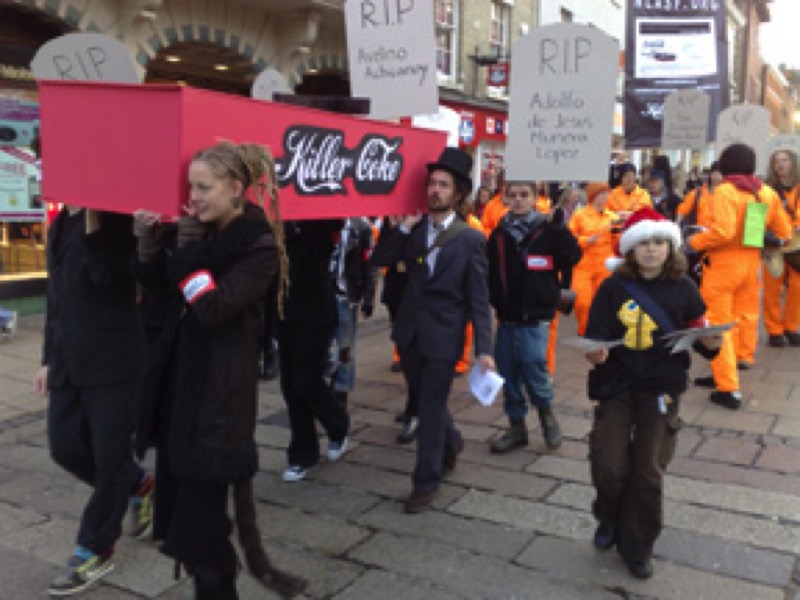
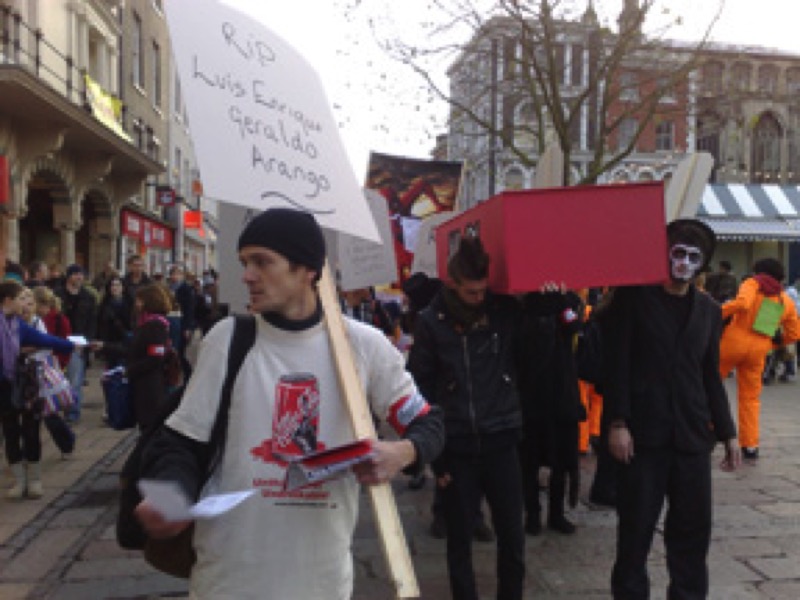
Report from the Campaign in England
"It's been a busy couple of months in Norwich as the University of East Anglia's Killer Coke Campaign joined forces with Norfolk Latin America Forum and the Jamnesty Junk Band to kick of a season of events raising awareness of the crimes of Coke both on campus and around the city of Norwich.
"Activist, comedian and general inspiration Mark Thomas was in town, so what better time to launch the campaign. Mark's show was great as he recalled his experiences uncovering Coca-Cola's dubious ethical legacy from sponsoring Hitler Youth in Nazi Germany to water depletion in India to trade union busting and murder in Colombia. Norwich KillerCoke collected lots of signatures from people pledging to boycott Coca-Cola until they clean up their act.
"The local group followed up the Mark Thomas show in November with a screening of the Mark Thomas' documentary about the highly unethical corporation with live music from Hazel Marsh and Chilean activist Mario Gomez. There was a prize draw with attendees winning KillerCoke t-shirts and DVDs.
"On Thursday 24th UEA played host to a Colombian student activist and political asylum seeker now resident in the U.K. The audience was told of the state collusion in paramilitary violence against students, trade unionists and members of the indigenous community.
"Saturday 29th November saw the campaign take to the streets with a mock funeral. Joined by the incredibly loud Jamnesty Junk Band and over 40 volunteers dressed in appropriate funeral attire, the Campaign marched through the streets spreading the word as Norwich citizens went about their early Christmas shopping.
"In the New Year UEA KillerCoke will be pushing for a boycott of all Coca-Cola products on the UEA Campus and within Student's Union stores to send a clear message to Coca-Cola that we will not tolerate human rights abuses in the name of profits. Norwich KillerCoke and Norfolk Latin America Forum will also be hosting a series of FairTrade Cola tastings throughout the city, so keep your eyes peeled for upcoming events!
"For more information or to get involved email killercokeUEA@gmail.com or visit www.NLASF.org."
Toronto Star, "City council passes bag fee and bottle ban: Councillors also vote to force take-out restaurants to develop food containers made of recyclable plastic," By John Spears, December 2, 2008
Read Article
"Toronto shoppers will start paying five cents for throw-away plastic shopping bags starting June 1, Toronto council has decided. And despite a determined lobby from bottled water companies to block the measure, councillors voted to ban the sale or distribution of bottled water immediately at City Hall and the city's civic centres where contracts permit."
Toronto Star, "Toronto stood up to bottled water industry," By Tony Clarke, December 11, 2008
Read Article
"Toronto's decision last week to ban the sale and distribution of bottled water on city premises was a watershed moment for water justice advocates the world over. What was truly significant about Toronto's action was not that it banned an environmentally destructive product, but that it included a commitment to ensuring access to tap water in all city facilities."
SHROC VII [Southern Human Rights' Organizers' Conference] Declared a Coke-Free Zone!
We received an email today [Dec. 9] from the Southern Coalition for Social Justice: "...Just as we did for SHROC VI in Houston December 2006. We successfully got the Radisson to contractually agree that no Coke products will be served at the conference this year. SHROC will be declared a Coke Free Zone!
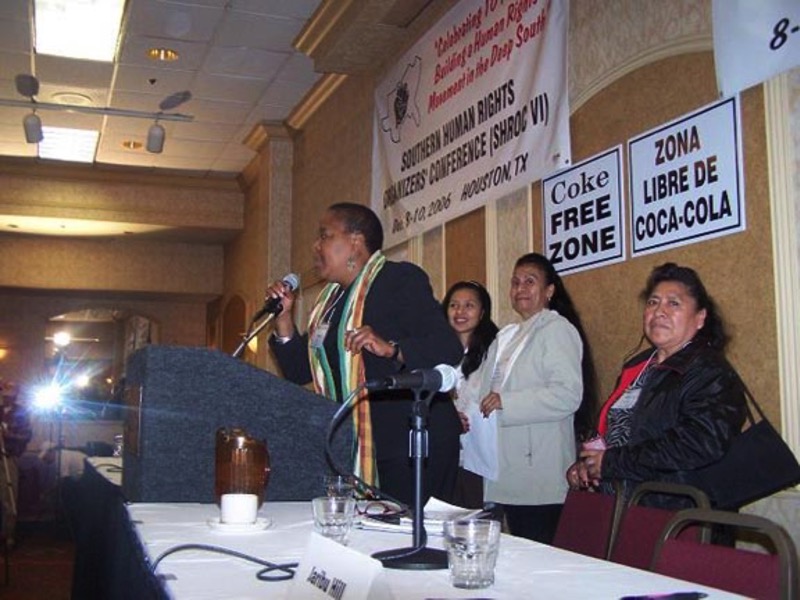
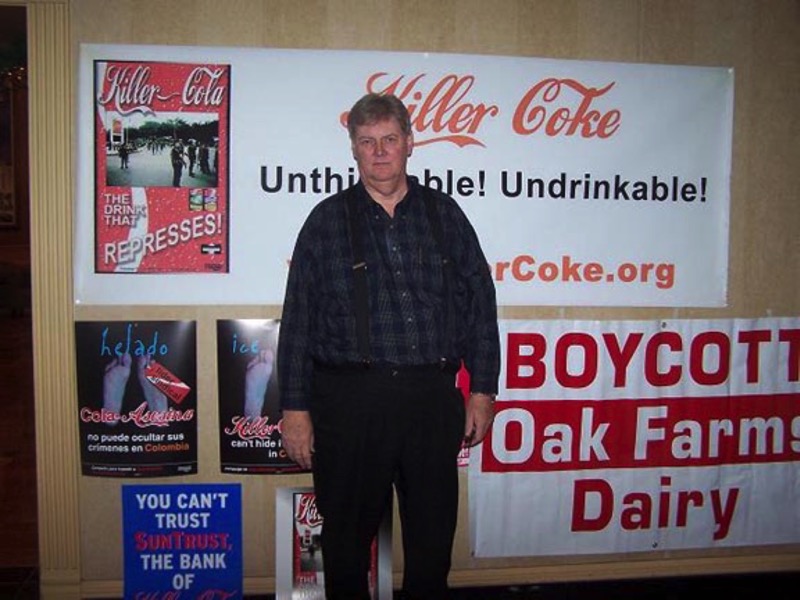
Photos from SHROC in 2006
The Maine Campus, "Coke 'killers' on prowl at UMaine," By Aislinn Sarnacki, November 24, 2008
Read Article
"Pepsi, Coca-Cola, A&W and Jones - all a part of the same carbonated family? Not according to Killer Coke, a campaign that has reached the University of Maine. UMaine's 10-year contract with Coca-Cola will expire on June 30, 2009...The Campaign Against Killer Coke began in April 2003. The small organization spreads the message that Coca-Cola is involved in numerous unethical practices in several countries. The main goal is to encourage boycotts on Coca-Cola products."
India Resource Center, "Coca-Cola's Latest Scam - Water Neutrality," by Amit Srivastava, November 25, 2008
Read Article
"Becoming water neutral is impossible, and Coca-Cola is very well aware of this. But matters like that have never stopped the company from making preposterous claims, however misleading and troublesome they may be. What is surprising, however, is the complete lack of scrutiny that Coca-Cola is subject to by the corporate social responsibility community and the media. Allowing Coca-Cola to get away with such a disingenuous plan significantly weakens the core aims of corporate social responsibility as well as objective reporting and makes CSR nothing more than an extension of public relations for companies."
Two Videos from The Chloe Show on the Campaign
Watch "The Chloe Show-Killer Coke"
Watch the first Video from The Chloe Show. Chloe speaks about the Campaign to Stop Killer Coke at about 1:15 into this video.
Belfast Telegraph, "TEEU urges members to boycott Coca-Cola," November 23, 2008
"Trade Union members were urged to choose Pepsi over Coca-Cola.
"The Technical Engineering and Electrical Union said Coca-Cola's policies are anti-union and unethical, after it closed its Drogheda plant earlier this year with the loss of 250 jobs.
"It wants its members to boycott the company's products.
"TEEU spokesperson Arthur Hall said consumers need to use their power and think about how they spend their money."
International Labor Organization, "Report Evaluation Mission Coca-Cola Bottling Plants in Colombia 30 June - 11 July 2008"
Read the ILO Report
"...the Mission found that there appears to be a link between outsourcing and the fall in union membership and/or the fact that these workers do not organize.
"One union representative (SINTRAINDEGA), from the Bogota South plant, said that "with the company's hiring system, the union is destined to disappear... In the space of one year we have lost 100 members." [Another union,] USITRAG, said: "The main problem is that very few have a direct relationship with the enterprise. This is due to the way in which the enterprise hires workers who provide certain services; the problem is the high incidence of subcontracting. Because of this workers are unable to organize and the future of the union is in danger."
"The SINALTRAINAL representatives in the same plant agreed, observing that "Union membership has been decimated as a result of various ploys used by the enterprise such as the reinforcement of the accord [collective accords are agreements between employers and non-union workers]. All the unions are dwindling because the enterprise is standing in their way..."
The outsourcing of certain areas of the operation processes and, increasingly, of the production processes themselves, makes it difficult for the workers concerned to form or join unions..."
Exposing Coke's Lies About ILO Colombian Probe: the Campaign's Response to the ILO Report," November 19, 2008
Read the Campaign's Response.
"Coke claimed: 'On March 2nd, the International Union of Food, Agricultural, Hotel, Restaurant, Catering, Tobacco and Allied Workers' Associations (IUF) announced that it had requested the International Labor Organization (ILO) to investigate and evaluate past and present labor relations and workers' rights practices of the Coca-Cola bottling operations in Colombia...'"Coke's claims were contradicted by the IUF, Coke representatives and the ILO:
1. The IUF never asked for such an investigation.
The IUF's Ron Oswald: "Well, he [Coca-Cola Chairman and CEO E. Neville Isdell] was wrong, and they know he was wrong...Our proposal to the ILO was very clear: we did not ask them to do an investigation into criminal or murderous events in the 1990s...I don't think they've got the competence to do that, frankly... There are still calls for Coke to agree to an independent investigation of those incidents and that's something we thought Coke should have agreed to many years ago."
2. The Company never supported such an investigation.
Coca-Cola's Dana Bolden wrote: "The agreed-upon scope of the assessment [in Colombia] was always of current workplace practices."
3. The ILO never agreed to conduct such an investigation.
The ILO's Sally Paxton said: The ILO would at most be carrying out an "assessment of current working conditions at enterprises in Colombia" and not an "investigation" of The Coca-Cola Co. or past labor practices or human rights abuses of its bottlers.
Washington Square News," Coke ban vote pushed to Feb.," By Arielle Milkman, December 1, 2008
"The ban, enacted in December 2005, prohibits the sale of Coca-Cola products on campus until the company agrees to an independent assessment of its labor practices in Colombia following allegations that it sponsored the murder of several union leaders at its Colombian bottling plant...
"The ILO report concluded that though Coca-Cola has enforced child labor laws and has encouraged equality and nondiscrimination in the workplace, not all of its workers have benefited. Since the company outsources many of its positions to subcontractors in Colombia, not all workers share the same rights as direct Coca-Cola employees."
PBS, "Coca-Cola, Indian Farmers Compete for Water Supply," The NewsHour with Jim Lehrer, November 18, 2008
Watch Video or Read Text of Segment
"The India Resource Center worked closely with Public Broadcasting Service (PBS) producers to highlight the critical campaign against Coca-Cola in Kala Dera in the state of Rajasthan. The story aired on NewsHour with Jim Lehrer on November 17, 2008 which has a daily viewership of 2.7 million in the US. While we think that the story missed some key points and could have been much stronger, we welcome the national attention nevertheless."
PinoyPress, "Aspartame: Sweet, Sweet Poison," By Carlos H. Conde, November 25, 2008
Read Article
"Reading all the stuff about aspartame could make your head explode. But what convinced me that aspartame is not safe are not just the studies that have found its link to cancer but also the efforts of Donald Rumsfield and Searle/Monsanto in ramming this product down our throats. Monsanto, as you know, is the world's leading producer of genetically modified products - another innovation that many are convinced has already wrought havoc on human life and the ecosystem - and uses not just money and influence but also threat and intimidation on those who go against it, as this Vanity Fair investigative report makes clear. Indeed, Monsanto's track record alone is enough to convince me that this product can kill me."
India Resource Center, "Norway Students Vote to Restrict Coca-Cola: Seek Ethical Alternatives to Coca-Cola," November 11, 2008
Read Release
"Students at the University of Oslo have voted overwhelmingly to restrict the dominant presence of Coca-Cola products on campus, and introduce ethical alternatives to Coca-Cola on campus. In a resolution passed yesterday at the University of Oslo Welfare Council (Velferdstinget I Oslo), the student body will now seek to restrict significantly the size of Coca-Cola's contract, offer alternative beverages that are ethical and fair trade as well as adopt more stringent criteria for ensuring that companies that do business with the University of Oslo have strong environmental and ethical records. The student body will also inform Coca-Cola of their decision to restrict Coca-Cola, citing the company's practices in India."
The Miscellany News, "Administration must act on Coke resolution," By Reed Dunlea, November 5, 2008
Read Opinion Piece
"On Oct. 10, the Vassar Student Association (VSA) Council voted to support "replacing the sale of Coca-Cola products on campus with a viable alternative company (or companies)." The resolution and the Vassar Kick Coke Campaign (a coalition of six VSA organizations) urge the administration to remove all Coca-Cola products from campus. A whopping 68 percent of students who responded to their VSA representatives' requests for feedback on the resolution supported kicking Coke."
The Miscellany News, "VSA Council [Vassar College] passes resolution advocating the removal of Coca-Cola products from campus," By Matthew Brock, November 3, 2008
Read Article
"At the Vassar Student Association (VSA) Council meeting on Nov. 2, Council passed the Kick Coke campaign's resolution by a vote of 14 to 8-only one vote above the majority required to pass..."
"Reed Dunlea '09, a member of the Kick Coke group, opened the discussion at Sunday's meeting, addressing some of the largest concerns raised about the campaign over the past week. Dunlea explained that the resolution, which states the VSA Council's support for removing Coke products from campus, was not a question of student choice. "This campaign is about the institution and community of Vassar College lending its support to people who've been negatively affected by Coke's practices," said Dunlea. He reminded the audience that even if Coca-Cola products are banned from campus, students can choose to purchase the products off-campus."
Read Adopted Resolution
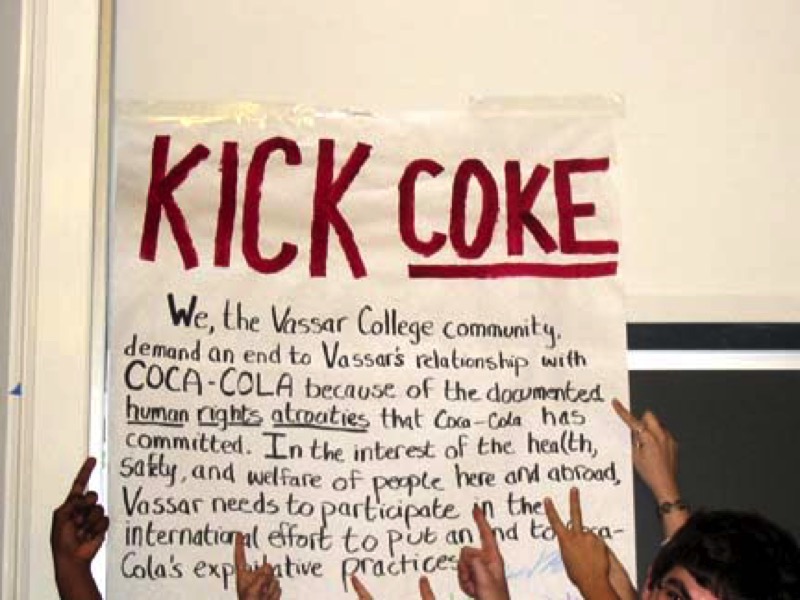
The Kick Coke Campaign, Vassar College, February 22, 2007
IBEW Local 2323 [International Brotherhood of Electrical Workers] Executive Board votes to eliminate Coke products from union meetings and events, Oct. 30, 2008
This motion was presented at the October 30, 2008 Executive Board meeting.
The motion was made, seconded and approved to support the boycott. Information explaining the reason for the boycott will be distributed to the membership of IBEW Local 2323 at union meetings.
"I make a motion that IBEW Local 2323 will support the boycott of Coca Cola products that include Dasani, Fanta, Minute Maid, Nestea, Powerade and Sprite at our union meetings and events.
"Additionally, we will support trade unionists in their efforts to represent Coke workers in Columbia and other locations worldwide."
Press Release, "Coca-Cola Sustainability Review Omits India," By India Resource Center
Read Release
"The Coca-Cola company released its 2007/2008 Sustainability Review yesterday, and surprisingly, critical issues facing the company's operations in India do not find mention in the review. The Coca-Cola company gives itself high marks in its sustainability report which covers areas such as the workplace, environment and community engagement. However, the omission of the issues facing the company in India - various community campaigns accusing the company of creating water shortages and pollution - raise the question whether Coca-Cola's sustainability report is an attempt to manufacture a green image of itself rather than actually addressing the critical challenges facing the company's operations."
KillerCola Kills
Click here or above to watch video
The Globe and Mail, "Maude Barlow: the Al Gore of H2O," By Erin Anderssen, October 25, 2008
Read Article
"The outspoken Canadian activist tells Erin Anderssen that she will bring the same doggedness she displayed in opposing NAFTA and globalization to her new post as the UN's senior adviser on water issues.
"...Ms. Barlow sat for two days in a small village with mothers who were holding a silent vigil to protest against a Coca-Cola plant that was siphoning off their water to bottle it. She was tear-gassed during an anti-globalization rally at the World Trade Organization meeting in Hong Kong in 2005."
Interview with Maude Barlow, Democracy Now! September 12, 2008
Watch the Interview
Song Video, "Pour Coca Cola Down the Drain," By Gary Kaye
Watch on YiuTube
An army marches on its stomach
An army falters on its thirst
Coca Cola had the ans wer
And now the world lives with this curse
So the Nazis placed an order
They said it's good for heart and brain
Coca Cola's very evil
Pour Coca Cola down the drain
Read the rest of the lyrics
Video, "The Cost of a Coke 2nd Edition," By Matt Beard
Matt Beard's new movie, "THE COST OF A COKE: 2ND EDITION" has been released.
Click above or here to see the video.You can also go to Matt Beard's new website, www.BattleforJustice.com, to see this and other videos. Email Matt at justice.beard@gmail.com for info on how you can get a DVD with an Update on THE ILO's "INVESTIGATION" into the murders and corruption.
The Guardian, "To Die For: Being a trade union organiser in bottling plants used by Coca-Cola in Colombia is a dangerous business - they are prime targets for death squads. Can Coke be held responsible? Mark Thomas follows the trail from Bogota to New York," Excerpt from "Belching Out the Devil," By Mark Thomas, September 20, 2008
Read Excerpt
"When I asked Coca-Cola about these talks, it portrayed them as 'fruitful and informative'. The purpose of the talks, the company said, was 'to assess whether a mediated resolution of the parties' differences could be achieved'. In short, it was looking to settle out of court, and with a settlement such as this comes money - a lot of money. How much? A barrowful. Although I cannot disclose the exact sum offered to Sinaltrainal and the plaintiffs in the lawsuit, it is my understanding that it had six noughts at the end of a dollar sign and a couple of digits in between.
"If the company was offering money, what were the conditions attached to it? I spoke to Ed Potter, the Coca-Cola Company's global workplace rights director, a man with intimate knowledge of these negotiations. I said to him that the company had history in this department: 'Financial settlements are reached, but part of that financial settlement is that you don't criticise us again, you shut up, you go away.' Potter replied, 'All I will say, as a general matter, is we've had several different resolutions ... You've described one of them.'
"Sinaltrainal did not use the words 'fruitful and informative' to describe the talks. 'We were in a process that lasted almost a year and a half, where we talk and talk and talk with them in order to find a solution to the conflict - and it didn't give us any result at all,' says Edgar Paez, the union's international officer. He is sitting in his office, by the same table where Giraldo and Manco gave their testimonies. The only reason Coca-Cola negotiated, he believes, was 'because they don't want us to keep reporting them [campaigning] ... What the company wanted was to buy the silence of the people involved. They give some money to the victims in order not to denounce the problem.'
The negotiations broke down in early 2008. Coca-Cola said 'no final resolution was possible. An impasse was reached and no further discussions are anticipated at this time.' Arguably, the impasse was a result of the conditions of the settlement: Coke would pay millions of dollars, but anyone working for Coca-Cola Femsa and involved in the lawsuit had to leave their jobs - they could no longer work for Coke's contractors. But more than this, they would be legally bound never to criticise Coca-Cola again. According to Paez, this would apply 'not only in Colombia but everywhere in the whole world. They wanted us to sign an agreement that no one would denounce Coca-Cola any more, for the rest of their lives.' In effect, the agreement, if signed, would prevent them from campaigning against any multinational that Coca-Cola had business with. From the moment they signed until the day they died."
Mark Thomas on 'Belching Out the Devil'
Mark Thomas read from his new book-Part 1
Mark Thomas read from his new book-Part 2
Mark Thomas read from his new book-Part 3
Coke vs. Pepsi: The Truth is Out
Video, "The Hard Truth About a Soft Drink," By Natalie Bogard
The Canberra Times, "Coke draws the fizz for myth-busting ad," By Jullian Lee, October 15, 2008
"The Australian Dental Association has called on the company [Coca-Cola] to withdraw the full-page ad - which busts myths that fizzy drinks are unhealthy - saying the information was either ambiguous or wrong. The association took exception to the claim that the ad busted the "myth" that Coke rots teeth.
"Its president, Dr John Matthews, said: 'We shouldn't rely upon Coca-Cola for giving us dental health advice. They have underestimated the problem and put a spin on it. Most people know Coke is bad for them but they continue to do it so I don't know why Coca-Cola feels the need to do this.' "
"Dispatches: Mark Thomas on Coca-Cola"
If interested in this important film by Mark Thomas, please contact the Campaign at info@KillerCoke.org
Metrolife Books, " 'Ice-cold Coca-Cola: Belching Out The Devil,' by Mark Thomas," Aricle by Sharon Lougher - Tuesday, October 14, 2008
"As a child, Mark Thomas adored Coca-Cola. He'd drink it whenever he visited his much-loved nan - a warm family image that would doubtless play nicely with the company's brand managers.
"A few decades on, and this formidable comic campaigner continues to unravel claims, first highlighted in his Dispatches programme for Channel 4 last year, of the company's alleged corporate irresponsibility regarding the behaviour of those employed within its complicated web of franchisees and distribution deals.
"After a nauseatingly saccharine experience at the Coca-Cola Museum in Atlanta, he uncovers many fascinating case studies: in Colombia, union members claim they have been badly treated by bottling facility managers; in India, Coca-Cola factories are using so much water the land is sucked dry.
"What emerges is a disheartening and frustrating tale of a company seemingly trying to extricate itself from being ethically liable for those who work under what it calls 'the Coca-Cola system'.
"Thomas is effortlessly funny and vivid in his description of every furrowed unionist brow and makeshift protest shelter. The company mostly stonewalls his efforts to make it redress the balance but Thomas's study isn't in vain: if this book doesn't make you boycott The Coke Side Of Life, few things will."
S&B News, "Book Festival: A look behind the Coca-Cola brand," By Richard Pain, September 10, 2008
Read Article
"POLITICAL activist, comedian and writer, Mark Thomas, provides one of the standout attractions of the Guildford Book Festival when he arrives to give an insight into his latest work, Belching Out The Devil...Focusing on the workers and events that are not part of the company's multimillion-dollar advertising campaigns, he exposes a series of provocative tales."
Metro.co.uk, "Five questions for... Mark Thomas," by DAVID BALDWIN, October 5, 2008
Read Article
"Both cheeky comic and committed campaigner, Mark Thomas is on the case of Coca-Cola in his new book, 'Belching Out The Devil', which takes the company to task with accusations of human rights abuses."
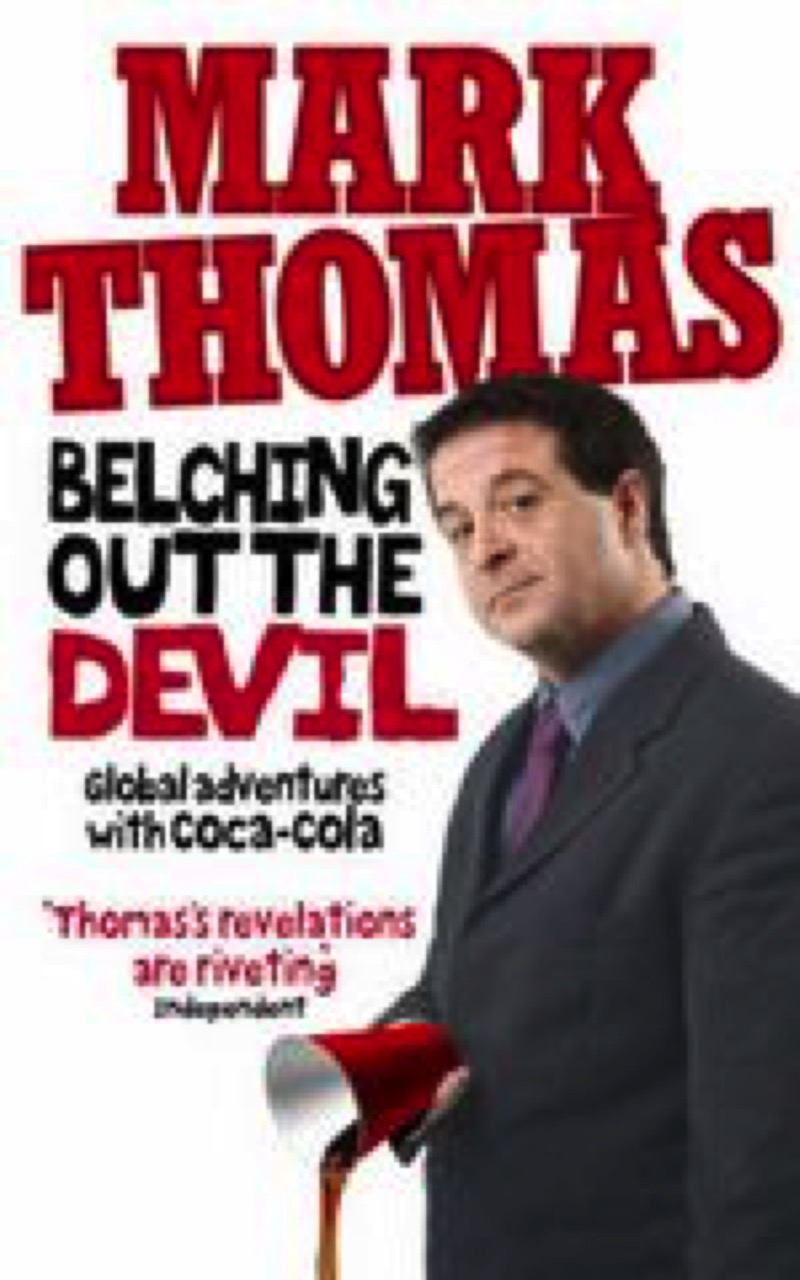
India Resource Center, Review of "Belching Out the Devil: Global Adventures with Coca-Cola"
Read Review
theage.com.au, "The bitter-sweet truth about vitamin water," By Mark Russell, September 21, 2008
Read Article
"Vitamin and sports water drinks are so laden with sugar and caffeine that claims about their health-giving benefits should be taken with a grain of salt, nutritionists have warned.
"Consumer advocate group Choice says an unwitting public is being deliberately misled about the health benefits of enhanced water drinks, with some 500-millilitre varieties containing eight teaspoons of sugar, high levels of caffeine and a host of additives, including flavours and colours.
While it purported to be a healthy beverage, a 575-millilitre bottle of Nutrient Water contained seven teaspoons of sugar, she said, and Smart Water's 500-millilitre bottle had eight teaspoons. A 375-millilitre can of Coca-Cola contains 10 teaspoons of sugar."
Democracy Now! "FLOW: For Love of Water...New Film Examines Global Water Crisis," September 12, 2008
Read about film and watch the DN! segment
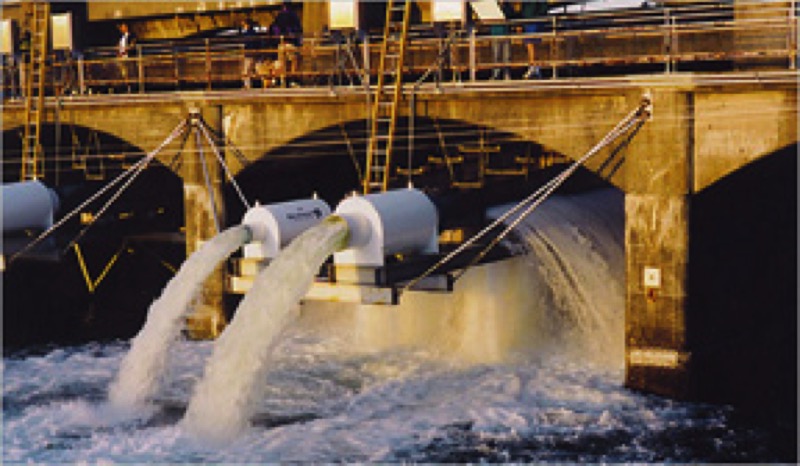
FLOW: For Love of Water is a new documentary premiering in New York and Los Angeles today that takes on the global water crisis. We speak with filmmaker Irena Salina and water rights activist, Maude Barlow, head of the Council of Canadians, founder of the Blue Planet Project and author of several books, including Blue Covenant: The Global Water Crisis and the Coming Battle for the Right to Water.
Interview with:
Maude Barlow, head of the Council of Canadians, Canada's largest public advocacy organization, and founder of the Blue Planet Project. She is the author of sixteen books, including Blue Gold. Her latest is Blue Covenant: The Global Water Crisis and the Coming Battle for the Right to Water. She is a recipient of Sweden's Right Livelihood Award, known as the "Alternative Nobel."
Irena Salina, award-winning filmmaker. She is the director of FLOW.
Click here to go to the film's website.
The New York Times, "Flow: The War Between Public Health and Private Interests," By Jeannette Catsoulis, September 12, 2008
Read Review
"A documentary and a three-alarm warning, "Flow" dives into our planet's most essential resource - and third- largest industry - to find pollution, scarcity, human suffering and corporate profit. And that's just in the United States."
There is a segment in the film highlighting the demonstrations at the Coke bottling plant in Plachimada, India. These demonstrations led to the closing of the plant.
India Resource Center, "Coca-Cola Continues Unethical and Dishonest Practices in India, Company Must Follow Recommendations of Company Funded Study: Shut Down Kala Dera Bottling Plant," By Amit Srivastava, September 12, 2008
Read Article
" It is said that those who don't learn from the mistakes of the past are destined to repeat them. It seems that the Coca-Cola has not learnt any lessons from its past mistakes in India. The manner is which the Coca-Cola company has decided to deal with another formidable community-led campaign in India — in the village of Kala Dera in the state of Rajasthan — is indicative of the arrogance and impunity of the company that has landed it in trouble before. And Coca- Cola in India is in for a rude awakening, once again."
The Oregonian, "For bottled water, we pay twice — not counting all the unrecycled bottles, By Shelby Wood, September 12, 2008
Read Article
"Coca-Cola and Pepsi, makers of the No. 1 and 2 top-selling waters under the Dasani and Aquafina labels, have been pressured to spell out that their products begin as plain old tap water, from public supplies already deemed safe to drink by the Environmental Protection Agency...
"Bottled water, of course, doesn't cost $4 a gallon. It costs $5.76 a gallon (for a bottle of Dasani, at 4.5 cents per fluid ounce). The same amount of Fiji ("Every drop is green") will set you back $7.55. Celebrity-endorsed, electrolyte- enhanced Smartwater ('the water with all the answers') is $6.14. Arrowhead, in an 'Eco-Shape' bottle, is a relative bargain, at $4.48 per gallon."
Trailer, "The Cost of a Coke: 2nd Edition," By Matt Beard
Watch Trailer
The Cost of a Coke: 2nd Edition Coming Soon!
Watch on YiuTube
CHINA.ORG.CN, "Coca-Cola accused of manipulating public opinion," By Zhou Jing, September 9, 2008
Read Article
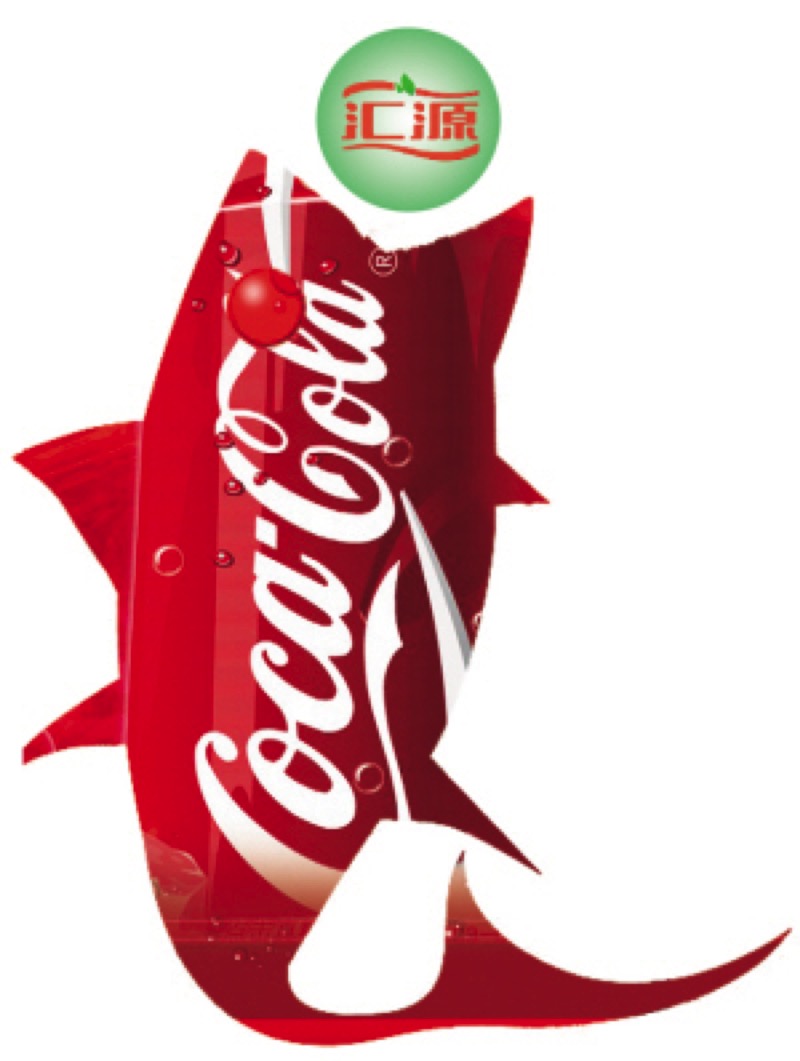
"On September 5, Qian Weiqing, a lawyer at the Dacheng Law firm, was invited to participate in an online discussion about the proposed takeover. He said that given the state of public opinion and the provisions of the Anti- Monopoly Law, 'the prospects for the purchase do not look optimistic,' adding that 'public opinion has taken a nationalistic turn on the issue, and is likely to directly or indirectly influence the regulator's decision,' and that consequently 'the bid will have a tough ride at the Ministry of Commerce.'
"The insider said that soon after the interview, Coca Cola called the Dacheng Law, demanding Qian withdraw his comments, adding pointedly that Coca Cola employed many of Dacheng's lawyers as counselors. 'Which is more important, just think it over!' was the gist of Coca Cola's message - according to the source. A few hours later, Qian announced that he had withdrawn his comments."
India Resource Center, Press Release, "Community Rallies for Coca-Cola Plant Closure: Demands that Coke Study Recommendations be Implemented," August 26, 2008
Read Release
"Residents living around Coca-Cola's bottling plant in Kala Dera, near Jaipur in Rajasthan, India marched and rallied yesterday demanding the closure of the bottling plant. Nearly 60 villages surrounding Coca-Cola's bottling plant in Kala Dera have complained of severe water shortages since the bottling plant began operations in the area. "
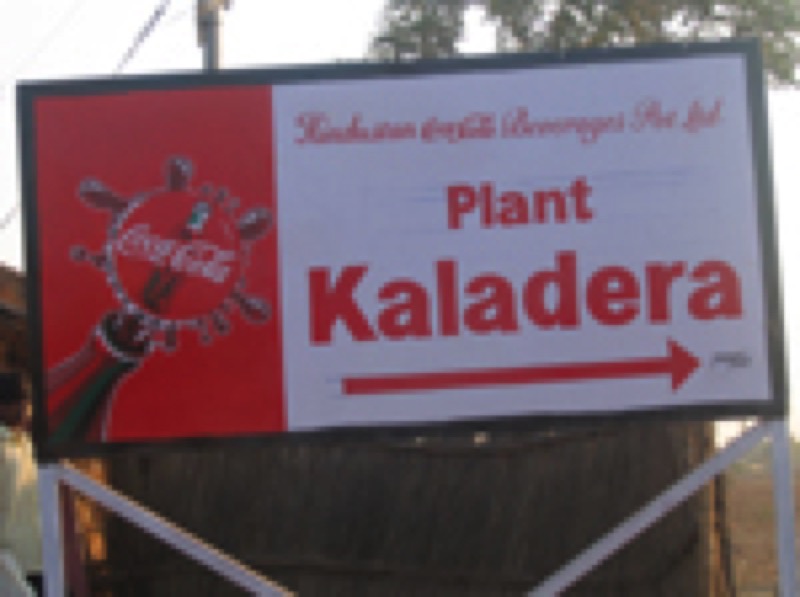
Daily News, "Spotlight on Great People: Corporate Campaign Inc.'s Ray Rogers banks on finance to defeat big business," By Clem Richardson, August 22, 2008
Read Article
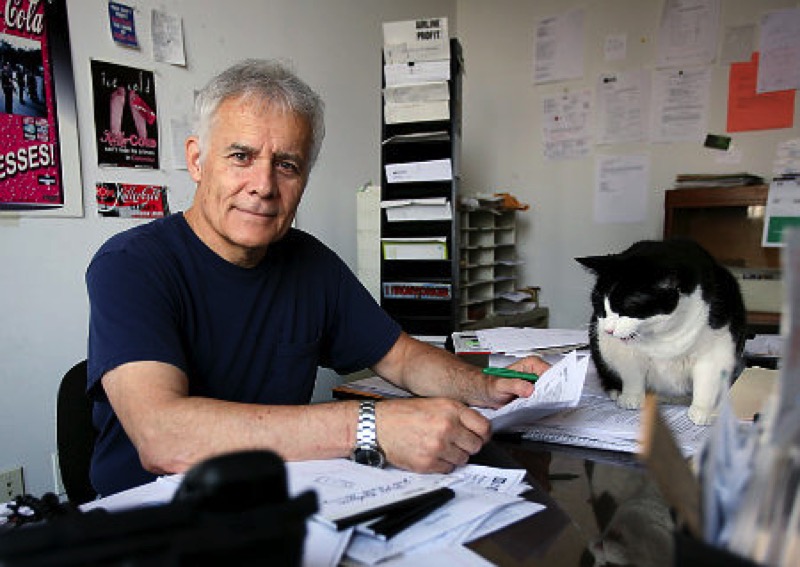
" 'A lot of people don't understand where power comes from,', Rogers said. 'It comes from organized concentrations of money and people. I realized that inherent with large organizations, like unions and all the members they represent, there is a lot of financial power there that had never been tapped. That financial power was and is being used against them.'
Article corrections: 1. In discussing the campaign to win a TWU Local 100 contract in 1999, there was no strike. The article should have stated: "The contract was settled shortly afterward." 2. TIAA-CREF has divested itself of more than one and a quarter million shares of Coca-Cola stock, not a quarter million.
The Atlanta Journal-Constitution, "Brits work to replicate Coke flavor," By Shelley Emling, August 19, 2008
Read Article
"The volunteers who run the Cube Microplex, a popular alternative film venue, don't agree on everything. But there's one issue that has total support: the anti-Coca-Cola movement. Opposed to Coca-Cola for what they regard as the company's 'dodgy' business and environmental practices, the operators of the Cube have never served Coke."
Commondreams.org, "Coca-Cola Plant Shut Down in India: Community Welcomes Decision, Company Cites 'Unbearable' Financial Losses," By India Resource Center, August 14, 2008
Read Release
"'Community campaigns in India have shut down Coca-Cola bottling plants in Plachimada and in Balia, and now we will ensure that Coca-Cola bottling plants in Mehdiganj and Kala Dera also meet the same fate,' said Nandlal Master of Lok Samiti, a community group challenging Coca-Cola's operations in Mehdiganj, near Varanasi. Lok Samiti worked very closely with the community in Sinhachawar towards the plant's closure. The Coca-Cola company is also the target of intense community campaigns in Mehdiganj and Kala Dera in India for creating water shortages and pollution. The company was forced to agree to an assessment of its bottling operations in India as a result of a sustained international campaign. The assessment, released in January 2008, was a damning indictment of Coca-Cola's water management practices in India. The assessment recommends that Coca-Cola shut down its bottling plant in Kala Dera because the plant contributes significantly to water shortages in the area.
OPSEU (Ontario Public Service Employees Union), "International Labour Updates: Coca-Cola products banned by OPSEU," July 28, 2008
Read Update
"We are requesting that locals contact their employers and request that Coca-Cola products be kept out of the workplaces and work meetings."
CNN.Money, "UPDATE: Colombian Bogota Fines Femsa COP201 Million For Pollution," August 12, 2008
Read Article
"The council of Colombian capital Bogota fined the local unit of Mexico-based soft-drink bottler Coca-Cola Femsa SA (KOF) 201 million Colombian pesos, or about $110,000, for dumping industrial waste waters in marshes located in the city's outskirts...The council's environment secretary's office said Femsa had been polluting the wetlands with industrial waste waters since 2006."
Timmins Daily Press, "Size really does matter — for groceries," By CATHERINE COLTON (Opinion), August 9, 2008
Read Article
"It's been called the "Grocery Shrink Ray" — this is the phenomenon that marketers are becoming more and more enamored with that sees the size of packaging (and the actual product inside) reduced while the price remains unchanged...It's been estimated that Coca-Cola will shortly begin shrinking their cans -- they've already begun in Hong Kong — from 355 millilitres to 330."
Amnesty International, "China Olympic Games the death penalty," Added July 2008
Watch Video
"If you are planning to either go to the Olympic Games in China, or plan on watching them on Television. You should bear in mind that the image that China is presenting to the world is a false one. The vast majority of its 1.2 billion citizens live in poverty, but by far the worst excesses of the regime in Beijing are that China executes more people than any other country on earth. Often for crimes that are not considered crimes in other countries, or at the most would carry a light sentence.
"These are not the principles of the modern Olympic Games. The Olympic are supposed to be a competition of sports men and women competing on a friendly national basis, and present sport as a healthy past time. The truth is that the games have been hijacked by big multi national companies like Coca Cola to persuade people to consume their unhealthy products. Coca Cola like China has one of the worst human rights records visa vie it workers. Not only in countries like Mexico, but even in the United States of America. So remember as you watch the Olympics, people are dying and being exploited for these games. That is hardly in the true Olympic spirit is it?" [from the info on YouTube.com re: this video]
Atlanta Journal-Constitution, "Isdell: Coke will be big in China"> By Joe Guy Collier, July 31, 2008
Read Article
"Despite the Beijing Summer Games and its sponsors drawing protests from human-rights groups, Isdell said Coke remains a proud sponsor. 'We believe that it adds to our brand in a very, very significant way,' Isdell said. 'There's always a downside to everything. Nothing works absolutely perfectly. But in this instance, we're very happy with the torch run. We're extremely happy with the Olympics in China.' " [ Perhaps Mr. Kent, Coke's next CEO, will settle the issues in Colombia since it is costing Coke tens of millions annually in lost revenues, mostly in North America, and a worldwide loss of billions of dollars in brand name value.]
Biloxi Sun Herald, "ResponsibleShopper.org Rates More Than 150 Top Consumer Companies, Exposes Big-Brand Abuses and Enlists Consumers in Cleaning Up Corporations," By Co-op America, July 30, 2008
Read Article
"Worried that your consumer dollars are rewarding bad corporations with problem practices? Concerned about greenwashing? Wish there was an easy way to get the dirt on America's biggest companies before you buy something? Looking for a way to pressure consumer companies you patronize to get responsible and clean up their acts? For concerned consumers, the answer to those questions is the newly expanded ResponsibleShopper.org Web site operated by Co-op America. The expanded Responsible Shopper site relaunched at 1:30 p.m. EDT today (July 30, 2008)."
MarketWatch, "ResponsibleShopper.org Rates More Than 150 Top Consumer Companies, Exposes Big-Brand Abuses and Enlists Consumers in Cleaning Up Corporations," July 30, 2008
"-- Coca-Cola: Coke's food and beverages are enjoyed by millions of people around the world. But the beverage giant has had adverse effects on millions more. In India, Coke was found to have pumped hazardous waste into farms fields and a local canal that flows into the Ganges. A study by an Indian organization found high levels of pesticides in all of the Coke products that it tested, 27 times higher than what is allowed under Indian regulations. Elsewhere, Coke has been accused of human rights violations in several countries, discrimination against women and minorities in its US bottling plants, union busting, and underwent an investigation by the Securities and Exchange Commission (SEC) for allegedly committing $2 billion in accounting fraud."
The Campaign to Stop Killer COke has had a link to The Responsible Shopper for a few years. When we receive emails or calls asking us about the record of Coke and other beverage companies, we have long referred people to this site. The newly expanded site not only rates these corporations, but links one to organizations like our Campaign that demand accountability from these corporations.
Polaris Institute, "Talking Back to Coke-Part 1" April 16, 2008
On April 16, the Campaign to Stop Killer Coke, Polaris Institute, Corporate Accountability International, India Resource Center, Coke large shareholder B. Wardlaw, Mark Thomas, Students for a Free Tibet, students and others went to Wilmington, Delaware, to confront the Coke policymakers with their crimes against humanity. The Polaris Institute, Canada, filmed participants answering the question, "What do you want to say to Coke?"
Protest Against Multinational Terrorism
This protest was in support of the Multinational Tribunal taking place on July 21, 22 and 23 in Colombia concerning the Crimes Against Humanity committed by transnational corporations in different sectors of the economy.
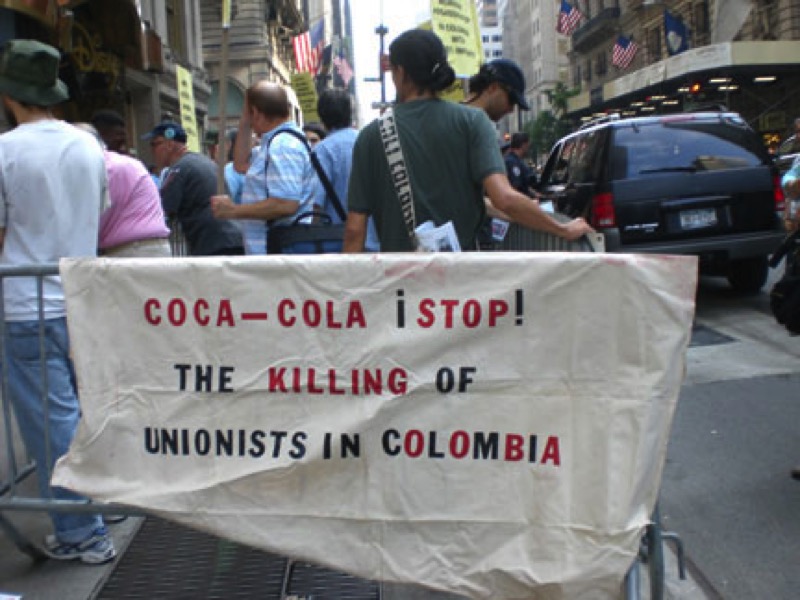
Watch Slideshow of demonstration
WKRG News 5, "COca-Cola Strike: Still No Talks," July 18, 2008
"It's day six of a strike involving Coca Cola Bottlers. We found union employees picketing this morning in Tillman's Corner. They are protesting Coca Cola's plan to take away their pensions. Employees say the move from pension plans to 401-k would cost some of them thousands of dollars.. Teamsters are also on the picket lines in Robertsdale, Leroy and Vancleave, Mississippi. 270 union workers are being affected by the pension plan change."
BaldwinCountyNow.com, "On strike: Picketers protest at Robertsdale facility," By Donna Riley-Lein, July 18, 2008
Read Article
"'What the company wants is to stop paying into the pension plan,' said Gookins in a phone interview. 'The contributions have not increased since 1990, at $69 per week. The federal government told them to increase that to about 8 percent...' Steele added striking workers will be expected to contribute an average of $1155 per month to continue their health plans under 'COBRA,' the Consolidated Omnibus Budget Reconciliation Act."
The New York Times, "Biggest Bottler of Coke Plans to Increase Prices," By Associated Press, July 18, 2008
Read Article
"Drinkers of Coca-Cola can expect to pay more starting this fall after Coca-Cola Enterprises, the company's biggest bottler, said Thursday that it would raise prices. Problems at the bottler also hurt the Coca-Cola Company's bottom line, because it owns about 35 percent of that business. Coke said Thursday that its profit fell 23 percent in the second quarter, when it took a charge because of the bottler's woes."
Bloomberg L.P., "Coca-Cola Falls; Profit Drops on Bottler's Writedown," By Duane D. Stanford, July 18, 2008
Read Article
"The bottler will increase U.S. prices after the Labor Day holiday, Brock said. 'North America is just a tremendous problem,' Tom Pirko, the president of Bevmark LLC, a consulting firm in Buellton, California, said in a Bloomberg Television interview."
Forbes, "Coke Earnings Bottled Up," By Lisa LaMotta, July 17, 2008
Read Article
"The taste of the milk is totally dependent on the health of the cow. Coca-Cola had a tough second quarter after its largest bottler Coca-Cola Enterprises [CCE] took a huge hit and came out with a loss. Coca-Cola Enterprises, one of 74 Coke bottlers in the U.S., wrote-down $5.3 billion related to a franchise impairment charge and lost $3.2 billion, or $6.52 per share, in the second quarter causing its share to drop 0.6%, or 10 cents, to $16.74 in afternoon trading on Thursday. Coca-Cola Enterprises accounts for 80% of Coca-Cola's U.S. market."
The Economic Times, "Coca-Cola net profit falls on writedowns," July 18, 2008
[It should be noted that as the Dow increased today [July 17, 2008] by more than 200 points, the value of Coke's stock dropped by $2 a share because of its dependency on its largest bottler, Coca-Cola Enterprises, according to the articles above. What the mainstream media doesn't discuss is that the campaign to make Coca-Cola accountable has had a great impact on CCE. Not only has the campaign cut out millions of dollars of their markets on campuses and large labor unions, but both Coke and CCE have been dropped from TIAA-CREF's $9 billion CREF Social Choice Account because the companies does not meet the criteria as being socially responsible.]
Rocky Mountain News, "Issue of Sudan on table for CEO," By James Paton, July 15, 2008
Read Article
"A group of activists, academics and gadflies kept the pressure on TIAA-CREF, urging its new CEO on Tuesday to dump stocks of companies that fail to cut ties to Sudan, to improve labor practices and to act more responsibly...
"One critic was Neil Wollman, a senior fellow at Bentley College in Massachusetts who has been needling TIAA- CREF since 1984. Wollman and colleagues are upset about labor practices at Nike, Coca-Cola, and Wal-Mart and want TIAA-CREF, which manages $420 billion in assets, to hold those companies and others accountable."
Post-Bulletin, Letters, "Parents no match for food marketers," By Jill Richardson, July 15, 2008
"If parents were to blame, why did the obesity crisis happen now instead of decades ago? The answer is because parental authority is usurped by food marketers in every opportunity they get...At the same time, school funding has declined in the last several decades and schools have reduced their physical education programs, ripped out their kitchens, and fired the lunch ladies. Companies like Coca-Cola and Pepsi prey on poorly-funded schools, offering incentives if they sell more soda."
London Progressive Journal,"Dying for a Coke," By Kacie Morgan, 11th to 17th July 2008
Read Article
"...A similar attempt to preserve the integrity of Coca-Cola within the soft-drinks market was made in 2007 advertisements [Satire of ad] that linked the company directly to Martin Luther King Jr. in a celebration of Black history. The campaign failed to mention his call for a boycott of Coca-Cola during the Civil Rights Movement following the discrimination of Black employees. Coca-Cola's tendency towards racial discrimination can also be observed in its alleged support of the 1936 Berlin Olympics and the advertisements placed in Hitler Youth booklets. Furthermore in 2001, Coca-Cola had to pay the largest racial discrimination settlement in US history of $192.5 million - a huge contradiction for a company that boasts of its " long-standing commitment to equal opportunity and intolerance of discrimination.
"Perhaps after reading thus far into the dark side of Coca-Cola, it may no longer shock you that this reputable company has long been practicing anti-worker and anti-environmental policies worldwide. The UK's Channel 4 Production, "Dispatches: Mark Thomas on Coca-Cola" of 2007, exposed child labour in El Salvador sugar fields. During sugar harvesting, the young workers suffer from smoke inhalation, burns and cuts from machetes yet have no access to healthcare. Despite this, Coca-Cola continues to spend $3 billion a year on advertising and claims to firmly oppose child labour."
The Dallas Morning News, "Coke bottler laying off nearly 80 Dallas finance workers," By Karen Robinson-Jacobs, July 11, 2008
"Nearly 80 workers in the Dallas office of soda bottler Coca-Cola Enterprises Inc. will probably see their jobs shipped overseas at year's end, the company said Friday."
The Atlanta Journal-Constitution, "Most Coke units in North America under hiring freeze," By Joe Guy Collier, July 11, 2008
Read Article
"Atlanta-based Coca-Cola Co. has imposed a hiring freeze for most of its North American business unit, a part of Coke that has struggled to grow profits and volume...An additional 150 jobs could be lost in the Tampa, Fla., area and 70 workers could be furloughed in Toronto, the company said."
The Seattle Times, "Waging the water-bottle battle," By Tom Watson, July 12, 2008
Read Article
"When we drink water, what's the real message in the bottle? Activists, governments and the bottled-water industry have engaged in a giant water fight for the past two years, extensively reported by the media. By now, many consumers know that the mass marketing of water in single-use bottles has environmental consequences, and that some reusable water bottles may pose health risks."
The Seattle Times, "Tapping the tap to save money and the planet: Feeling the economic pinch, more people are picking tap water over bottled water, By Tali Arbel (Associated Press), July 12, 2008
Read Article
"Measured in 700-milliliter bottles of Poland Spring, a daily intake of water would cost $4.41, based on prices at a CVS drugstore in New York. Or $6.36 in 20-ounce bottles of Dasani. By half-liters of Evian, that'll be $6.76, please. Which adds up to thousands a year. Even a 24-pack of half-liter bottles at Costco, a bargain at $6.97, would be consumed by one person in six days. That's more than $400 a year. But water from the tap? A little more than 0.001 cent for a day's worth of water, based on averages from an American Water Works Association survey - just about 51 cents a year.
"Coca-Cola Enterprises, the biggest bottler of Coca-Cola's Dasani, recently cut its outlook for the quarter; it said the weak North American economy is hurting sales of bottled water and soda - especially the 20-ounce single-serving sizes consumers had been buying at gas stations."
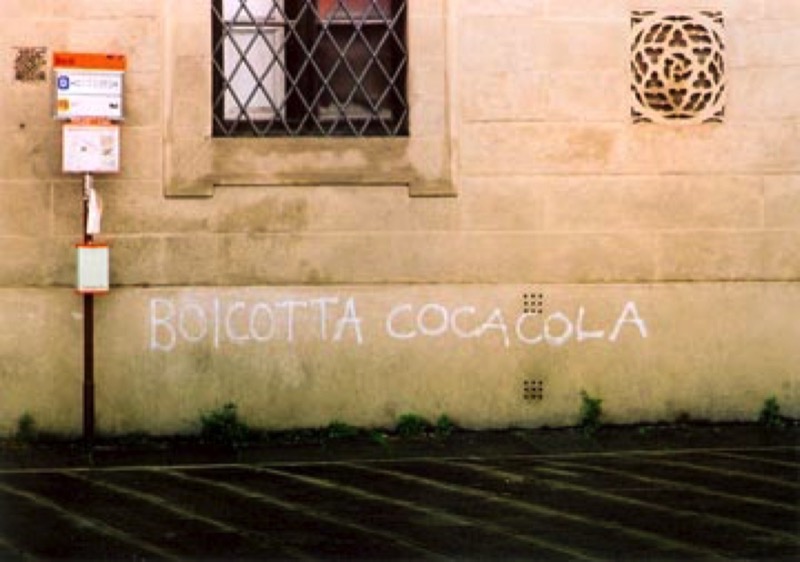
Recent photo taken in Florence, Italy, by Robin Bell
FlexNews, "Coca-Cola Agrees to Pay US$137.5 Million to Settle Fraud Lawsuit," July 4, 2008
Read Article
"Coca-Cola Co has agreed to pay US$137.5 million to settle a lawsuit in which it was accused of with-holding information to increase its stock price...Plaintiffs said bottlers in Japan were forced to buy extra syrup in an effort to inflate sales - called channel stuffing - so that Coca-Cola could post higher income and therefore artificially boost its share price."
News Release, "Coke Director Sam Nunn: A Bad Choice for Obama," Campaign to Stop Killer Coke, June 26, 2008
Read News Release
Please send this press release to any contacts you may have in the Obama campaign or the Democratic Party.
"Sam Nunn sits on the boards of four of the most abusive corporations in the world - The Coca-Cola Co., Chevron, General Electric and Dell Computers. All four have shown scant regard for human rights, the environment and/or the labor movement of the countries in which they operate. Yet Nunn has been silent about the abuses of his corporate bedfellows and, of course, is very well compensated as a board member."
The following is from the National Review blog.Even the right wing sees an Obama-Nunn ticket as a contradiction:
"Could The Democrats Seriously Run Obama-Nunn?
"Democrats on Capitol Hill are mentioning that they're hearing from the Obama campaign that former Georgia Senator Sam Nunn is on the list to be Obama's running mate.
"Perhaps Nunn could renounce all of his previous positions. But if he didn't, would the Democratic base be comfortable with a potential vice president who opposed Bill Clinton's plan to raise taxes, opposed gays in the military, supports school prayer, supports a balanced budget amendment, voted against prohibiting job discrimination by sexual orientation, voted in favor of abstinence education, opposed requirements for ethanol in gasoline, supports a Constitutional Amendment to prohibit flag burning, supports limits on death penalty appeals, limits on punitive damage awards, voted to overturn Bill Clinton's veto of the partial-birth abortion ban in 1996, once supported a Constitutional amendment to ban abortion, supported capital gains tax cuts as long as they were coupled to deficit-reducing measures, was once a member of a restricted country club, and was a member of the centrist Democratic Leadership Council?
"And who would, at age 70, pretty much take the "age" card away from the Democrats?
"How odd would it be to have a ticket of a man who ran his first political race in 1996, and a man who ran his last political race in 1990?
"I like Sam Nunn. But how many liberals would be slack-jawed at the thought of a running mate who had spent most of his legislative career voting against the ideas that make up the Obama vision?..."
Maple Ridge-Pitt Meadows Times, "SD42 considers banning plastic bottles of water," June 24, 2008
Read Article
"[Trustee Stepan] Vdovine, who has long been opposed to vending machines in schools, asked for a copy of the district's contract with Coca-Cola, but was told he couldn't have it because it was confidential...School districts and municipalities across Canada have already moved to ban the sale of bottled water from their schools."
Stony Brook University, State University of New York, removes Coke products from campus signing a 10-year contract with Pepsi.
The following email was forwarded to our campaign by a SUNY Stony Brook student:
"From: Angela Agnello, Director of Marketing & Communications
"Date: Wed, Jun 18, 2008 at 10:27 PM
"Subject: Stony Brook University is pleased to announce a ten year partnership with Pepsi for the exclusive beverage pouring rights at the University.
"To All Students:
"Stony Brook University is pleased to announce a ten year partnership with Pepsi for the exclusive beverage pouring rights at the University. This agreement will provide the campus with an exciting variety of beverages as well as significant support for student scholarships.
"The awarding of this contract was the result of an extensive, formal bidding process that included a committee of campus professional staff, undergraduate and graduate students. Pepsi's bid was rated highest in a variety of criteria that included both financial return and other important issues to the University and the campus community."
Congratulations to the Social Justice Alliance, students and faculty of SUNY Stony Brook for a hard-fought campaign and victory.
Read 'Stony Brook Kicks Coke Off Campus,' June 19, 2008
"The Social Justice Alliance (SJA) started the Coca-Cola Campaign on Stony Brook Campus in Fall of 2005, where they began educating students on the corporation's human rights abuses with SINALTRAINAL, a union in Colombia. They delivered letters to the Administration, informing them of the abuses and started holding panels and discussion forums to gain the support of the student body.
"Within months, the Undergraduate Student Government passed a resolution that called on the University to remove Coca-Cola Products from campus; and before the end of the spring semester, several undergraduate and graduate clubs called on the university to do the same..."Read more
Read 'Coke vs. Pepsi: The Eternal Argument,' By Charlene Obernauer, June 19, 2008
"Okay, so we know Coke and Pepsi are both bad. They're both corporate entities that have well-documented cases of social justice abuses, both in the United States and abroad. But at Stony Brook University, we were concerned with strategy, and as a strategy, we wanted to hurt Coke's profits and image as much as possible. We never supported Pepsi, and have noted the dangers of an exclusivity contract in general..." Read more
United University Professions (UUP) Delegate Assembly votes to boycott Coke, April 20, 2007
Read UUP Resolution
"...BE IT RESOLVED that the UUP Delegate Assembly recommends to the statewide UUP Executive Board that UUP not serve Coca-Cola products at its events, meetings, conferences, and delegate assemblies,"
Press Release from SUNY Albany, "The SUNY-Wide Campaign To Hold Coca-Cola Accountable: SUNY Stony Brook Passes The Test On Human Rights; SUNY Albany Fails!"
Read Press Release
"Kurt Amelang, a member of Students for Workers' Rights stated, 'SUNY Stony Brook's initiative on the Coca-Cola issue demonstrates their commitment to human rights. SUNY Albany, on the other hand, has failed workers in Colombia, farmers in India, and the students, faculty and community members who want human rights to be a deciding factor in doing good business.' "
Associated Press, "Darfur protesters target Coca-Cola," June 20, 2008
It should be noted, although not mentioned in the article, that Coke also does business in Sudan. Read Point 10 in our Talking Points.
Read Article
The Miami Herald, "Anti-bottled water campaign enlists mayors to cause: A campaign to wean consumers from bottled water enlists South Florida restaurants and city governments to the cause," By Taylor Barnes, June 20, 2008
"Miami's Mayor Manny Diaz is among more than a dozen mayors calling on municipal governments to phase out bottled-water purchases in a resolution to be presented at the U.S. Mayors Conference, which begins Friday in Miami.
"City Commissioner Marc Sarnoff, who pushed for the City Hall ban — which he says could save the city as much as $200,000 a year — joined the tap movement because of concerns about litter. He said 85 percent of bottles are not recycled, and contribute to clogging in Miami's sewer systems. He attributed current flooding in Brickell and the Venetian Islands to sewer systems stuffed with the plastic containers. He also pointed out that it takes petroleum to make the bottles, holding up a plastic bottle filled with dark liquid. He said almost a quarter of the liquid represented the oil needed to produce and transport the bottle."
Star Tribune, "Rybak, U.S. mayors: Reach for tap, not the bottle," By Paul Walsh, June 21, 2008.
Read Article
"Minneapolis Mayor R.T. Rybak and other mayors from around the country are urging all U.S. cities to stop spending tax money on bottled water, and instead drink from the tap....
"Distributors of bottled water, including Coca-Cola and Pepsi, oppose the campaign. Last year, Coca-Cola and the association passed out fliers at the Conference of Mayors that argued against a resolution to study the impact of bottled water on municipal waste."
The New York Times, "[New York] City Council Shuns Bottles in Favor of Water From Tap," By Jennifer Lee, June 17, 2008
Read Article
"The City Council has become the latest government agency to take a stand against bottled water. Last week, the speaker's office announced that it would stop buying bottled water for the Council's downtown offices, which went through at least 6,000 single-serving bottles last year. As a result, bottled water will no longer be available at City Council events or official functions...
"In June 2007, San Francisco's mayor, Gavin Newsom, prohibited spending city money on single-serving bottled water. Now, more than 30 cities and towns in the United States and Canada - from Fayetteville, Ark., to Seattle to Blue Mountains, Ontario - have taken steps to curtail spending on bottled water, according to Corporate Accountability International, an advocacy group that challenges corporate abuses and which runs the Think Outside the Bottle campaign...
"The movement, however, has raised concern in the beverage industry. Coca-Cola, Pepsi and the American Beverage Association have all increased their lobbying against it. Last year, Coca-Cola and the association passed out fliers at the Conference of Mayors that argued against a resolution, introduced by Mayor Newsom, to study the impact of bottled water on municipal waste..."
SINALTRAINAL et al, v. The Coca-Cola Company, et al., March 31, 2008
View Plaintiffs' Opening Brief
Summary: Advancing the legal efforts began with the United Steelworkers Union in 2001, IRAdvocates is working to hold Coca-Cola accountable for the murder and torture of trade union leaders in Colombia. This case also pioneered the use of a focused corporate campaign tied to the demands made by the Plaintiffs (see www.Killercoke.org). The case is currently pending in the 11th Circuit, and the parties have been in protracted discussions in an effort to resolve the issues.
Status: Plaintiffs' Opening Brief in Sinaltrainal, et. al. v. The Coca-Cola Company, et. al. was filed in the 11th Circuit Court of Appeals on March 31, 2008
Case Name: TURIDI et al. v. THE COCA-COLA COMPANY et al.
View Info on case
Summary: In 2005, 105 workers at a Coca-Cola bottling plant in Istanbul Turkey joined a union and were terminated. They organized a lengthy sit-down strike in front of the main offices of Coca-Cola in Turkey. After several weeks of protesting, the workers entered the building to demand their reinstatement. While leaders of the workers were meeting with senior management for the company, the company ordered Turkish riot police to attack the workers who were by all accounts peacefully assembled, many with their spouses and children. Nearly two hundred of them were beaten badly and many required hospitalization. The victims sued for torture under the ATCA, as well as battery, assault, emotional distress under New York state law. They also brought claims for unfair business practices because Coca-Cola has been representing to the public that they are not an anti-union company and they require their bottlers to respect fundamental worker rights. The case was initially dismissed on forum non conveniens grounds, with the Court ordering the case transferred to Turkey. Plaintiffs instead appealed to the Second Circuit Court of Appeals, where the case is pending. The case is currently pending in the 11th Circuit, and the parties have been in protracted discussions in an effort to resolve the issues.
Status: Pending in appeals court
Polaris Institute, "Feature: Coke's Annual Meeting of Contradictions," By Richard Girard, May 26, 2008
Read Article
"In this instant the contradiction between corporate social responsibility and greenwashing floated to the surface of the rarified air of a packed Hotel Dupont ballroom. When guaranteeing a profitable return to shareholders depends on exploiting and controlling resources and troubling social phenomena, rhetoric about sustainability rings hollow and self serving."
Commercials Against Coke--Ohio State University
This was part of a theatre project for Ohio State's 610 Directing Class, the commercials were used as part of a live performance calling attention to how Coca Cola does business around the world.
Click here or above to see video
Burlington Free Press (Vermont)>, "UVM anti-war group pushes divestment," By Tim Johnson, May 12, 2008
Read Article
NewsReview.com (Drexel), "Skool daze," By Ken Widmann, April 24, 2008
Read Article
"Free Schools (or Free Skools, as sometimes known) generally reject the commoditization of knowledge and have a bit of a radical bent. Hence Killer Coke Campaign: 'Learn about the evils of the Coca-Cola Co. and how we as community members and students can stop its influence in the world around us and the university.' "
The Statesman(Stony Brook University), "Bigger Better Bottle Bill Excluded From New York State Budget," By April Warren, May 8, 2008
Read Article
"The Bigger Better Bottle Bill, which would have expanded five-cent refundable deposits on beverage containers to water bottles and other non-carbonated beverages, was not included in the finalized state budget put out on Apr. 9 despite student activists' lobbying efforts...Bigger Better Bottle Bill opponents include the Coca-Cola Company, PepsiCo., Anheuser Busch, grocers and even some liquor store owners. The opposition is largely in response to the possibility of higher operating costs if the bill was included in the budget."
KillerCoke Funeral at Cardiff University, UK
Click here or above to watch the funeral
Washington Square News, "Vitamin Water ousted at NYU," By Jane C. Timm, April 30, 2008
"For just under a year, NYU has been selling the Coca-Cola product VitaminWater in dining halls and cafeterias, going against its own Coke product ban which has been in effect since December 2005. Glaceau, the company that produces VitaminWater, was purchased by Coke in May 2007. After an inquiry from WSN, university spokesman John Beckman responded by saying that the university would have VitaminWater off the shelves by the start of the summer term."
Consumer Choice, A Documentary by Anthropology students at Kent University, UK
Click here or above to watch the documentary
"A documentary by a group of anthropology students about our society's attempt to replace Coke Products in our student union outlets."
The Wall Street Journal, "The Coca-COla China Games?" By Mei Fong, April 29, 2008
Read Article
"Traditionally, those protesting the Games have targeted the host country or the International Olympic Committee, but nongovernmental organizations with increasingly sophisticated networks are now zeroing in more on corporate sponsors. Coca-Cola is particularly vulnerable because it sponsors both the Beijing Games as well as the contentious Olympic torch relay, which is scheduled to hit Chinese shores in a few days time. Already, protests have forced the company to cancel plans to sponsor a float in Japan, as the WSJ reported recently. The company was also publicly snubbed when some of its painstakingly selected torchbearers publicly turned down the honor, most notably Nobel laureate Wangari Maathai."
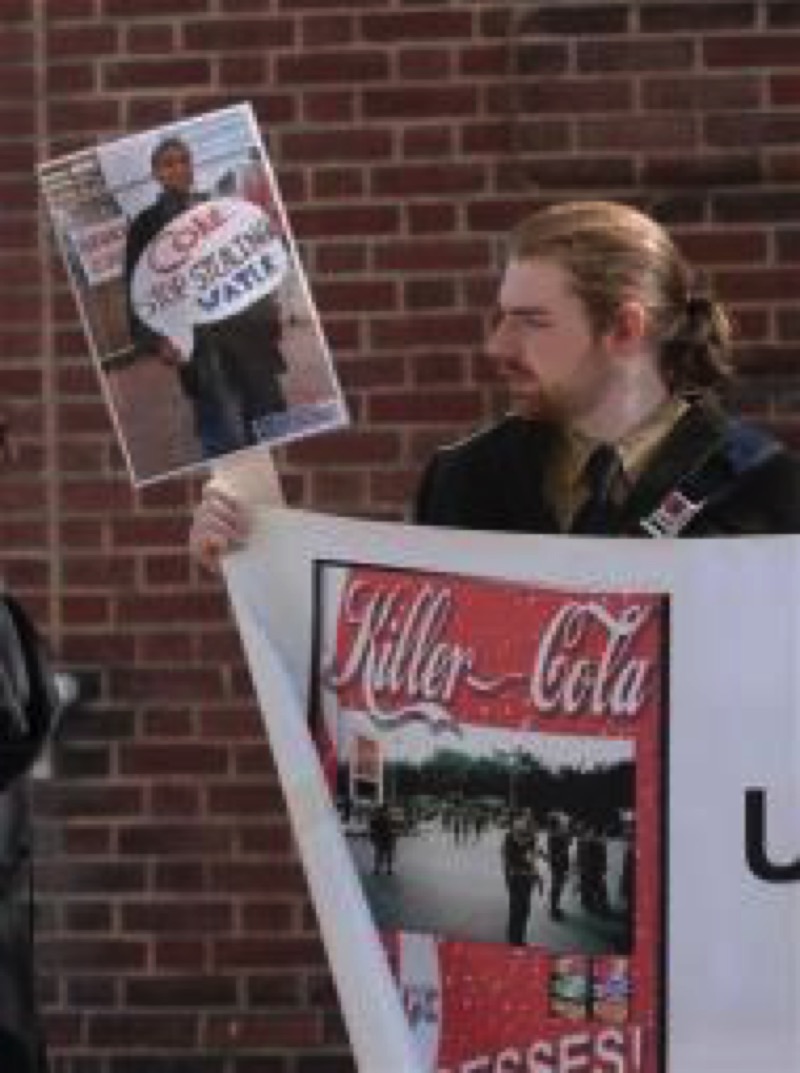
Jared Abbott, Campaign to Stop Killer Coke
(AP Photo/Bradley C Bower)
Brand Republic, "Protests 'will cut value' of Olympic ties," by Ed Kemp, April 29, 2008
Read Article
Read original article by subscription
"Persistent disruption to the Olympic torch relay has been followed by an open letter in which 150 activist groups claimed that sponsor, Coca-Cola, will be 'complicit in a humanitarian disaster in Tibet' if it fails to force the International Olympics Committee to direct the relay away from the territory."
Dow Jones Newswires, "Coca-Cola Enterprises Workers at French Facilities on Strike (DJ)," April 28, 2008
Read Article
Coca-Cola Enterprises Inc. said workers at two of its production facilities in France went on strike on April 17 over the negotiation of labor agreements...The largest bottler of Coca-Cola Co. (KO) drinks Thursday reported a 47% drop in first-quarter net income, citing a soft economy in North America and higher commodities costs."
It should be noted that Coca-Cola Enterprises is losing tens of millions in revenues from lost contracts at colleges, universities, high schools and elsewhere in the U.S., Canada and Europe as a result of the campaigns to stop Killer Coke.
India Resource Center, "China Olympics, Tibet Torture, Coca-Cola Profits," By Amit Srivastava, April 28, 2008
Read Article
"While China hopes to benefit politically by hosting the Olympic Games, Coca-Cola aspires to profit financially from the Olympic Games. Coca-Cola, it seems, will sponsor just about anything, as long as it sees potential profits...
"Coca-Cola was a primary sponsor of the 1936 Games. And the first modern day Olympic Torch Relay was initiated in Berlin in 1936, and Coca-Cola was its sponsor at that time too. While the magnitude of horror inflicted by Nazi Germany is unsurpassed and we hesitate to make comparisons with China's oppression in Tibet, one must raise serious concerns about corporate sponsorships that do not take human rights concerns into account, as was and is the case with the Coca-Cola company...
"Until then, we would encourage all torchbearers to cease being ambassadors for a company that is blind to everything except profits. And encourage consumers to think before they drink Coca-Cola."
Winnipeg Free Press, "World's food supply being mismanaged," By Dan Lett, April 28, 2008
"This is a crisis decades in the making. And when Coca-Cola syrup can be imported to a trade-embargoed, food-starved country under rules governing humanitarian aid, clearly the world's wealthiest nations need to rethink how they manage the world's food supply. As it stands now, the planet has become a powder keg, as starving people the world over panic over higher prices. Perhaps this is the crisis that will persuade the international community to rethink agriculture, trade rules and the way we administer foreign aid."
Washington Square News, "U. Senate, we commend you for upholding Coke ban," By Jeff Olshansky, April 24, 2008
"Coke's request that NYU lift the ban demonstrates that the ban applies pressure on Coke to change."
The University Register (University of Minnesota, Morris), "Coca-Cola contract can only be in bad conscience," By Andrew Swan, April 24, 2008
"While it is true that products produced and bottled in other countries stay within their own borders and are not being sold in the United States, accepting funding from a company [Coca-Cola] that so blatantly violates human rights and shows such an uncouth attitude towards the general populations affected by its factories seems counterintuitive to the socially progressive message of UMM [University of Minnesota, Morris]."
The Sydney Morning Herald, "Protesters turn gaze to Games sponsors," April 24, 2008
Read Article
"Activists believe their protests are having an effect. The torch relay's angry reception has discomforted sponsors Coca-Cola, Lenovo and Samsung. Last week, Human Rights Watch accused 'cowardly' partners of remaining 'largely silent' in the face of abuses...Robert Gooden, Amnesty's Asia-Pacific campaign co-ordinator, said. 'Corporations do have influence, and we would call on them to exert it publicly.' "
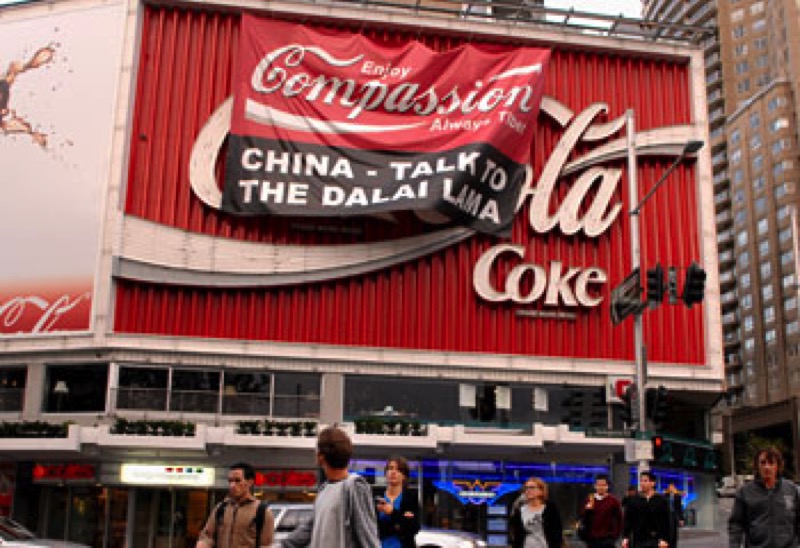
The Sunday Indian, "A SENSATIONAL TSI EXPOSE: Little Drops of Shame-Payal Knows her corporate career is destroyed. Yet, in an exclusive to TSI, she reveals how she will fight till the bitter end to ensure coke is punished for gender discrimination, harassment and humiliation. Sutanu Guru writes the searing saga of Payal," March 23, 2008
Read Article
"This is the gut-wrenching and sickening story of how The Coca-Cola Company - Atlanta and Coke India have refused to give justice to Payal Chawla Singh, who was once their Senior Legal Counsel despite documentary evidence that her seniors have harassed, discriminated and retaliated against her in the most petty, malicious and outrageous manner."

OPSEU (Ontario Public Service Employees Union) Votes to boycott all Coca-Cola Products
Ontario Public Service Employees Union (OPSEU), Resolution to ban all Coke products from all OPSEU offices and functions
Read Resolution
"We won, even when we were told we wouldn't. We won. OPSEU, as I have been told, is now the first Canadian union to officially call for the complete boycott of Coca-Cola and their subsidiaries and an all out ban of their products at any functions. We will also go after free trade agreements and unionized hotels that we deal with to stop carrying Coca-Cola.
"We also had a worker who is now a member of OPSEU who works as a paramedic and who is from Colombia. He was tortured by paramilitaries and he spoke against Coca-Cola just before the resolution.
"In the end, with 1600 people in the room and 851 voting delegates, only a handful voted against. It passed with flying colours. We won and now the struggle continues. Hopefully, other Canadian locals will get on board. This was a big victory for us at OPSEU."
Nelson Ross Laguna
OPSEU/IWW
Ottawa, On
Washington Square News (New York University), "U. Senate upholds ban on Coke: After long debate, senators reject resolution to bring company's drinks back on campus," Sergio Hernandez, April 18, 2008
"But supporters of the ban have criticized the ILO's investigation, questioning its neutrality and efficacy. Specifically, they have accused the organization of having a conflict of interest, because Ed Potter, Coca-Cola's director of global relations, is also a long-time member of the ILO...Senators also criticized the investigation's speed. It was originally announced in early 2006, spurring the University of Michigan to revoke its own Coca-Cola ban. But last year, the Michigan Daily reported that the ILO had fallen behind on all of its deadlines for the investigation."
Read more about the ILO "investigation" in Point 7 of the Campaign's "10 Critical Talking Points."
Washington Square News, "Letter: Coke gives no reason for NYU to lift ban on products," By John Patrick Leary, Graduate School of Arts and Science, April 21, 2008
"...[W]hile doing research in Colombia in 2003, I had the opportunity to meet many Coke workers and their families. They were exceptionally courageous; many lived under constant bodyguard. I became friendly with a Coke union activist named Efrain Guerrero. Shortly after I left, his brother-in-law and nephew were machine-gunned in their living room, killed to intimidate Efrain. Coke, his employer, should be held accountable for crimes like these. So far, it has not been."
Washington Square News, "With real change, NYU is a paper tiger," WSN Editorial Board, April 15, 2008
"We believe the university should not repeal the ban - as symbolic or as small as it may seem, it sends a message that NYU will not support a company with dirty labor practices."
NECN, "Coca-Cola accused of human rights abuses," Clark University, Worcester, Mass., April 9, 2008
See Video and Read Article
"With musical acts and signs, a group of Clark University students drew attention to the center of campus Wednesday hoping to get their message across. The group, called Campus Accountability Now, is against the distribution of Coca-Cola products, accusing the company of human rights abuses."
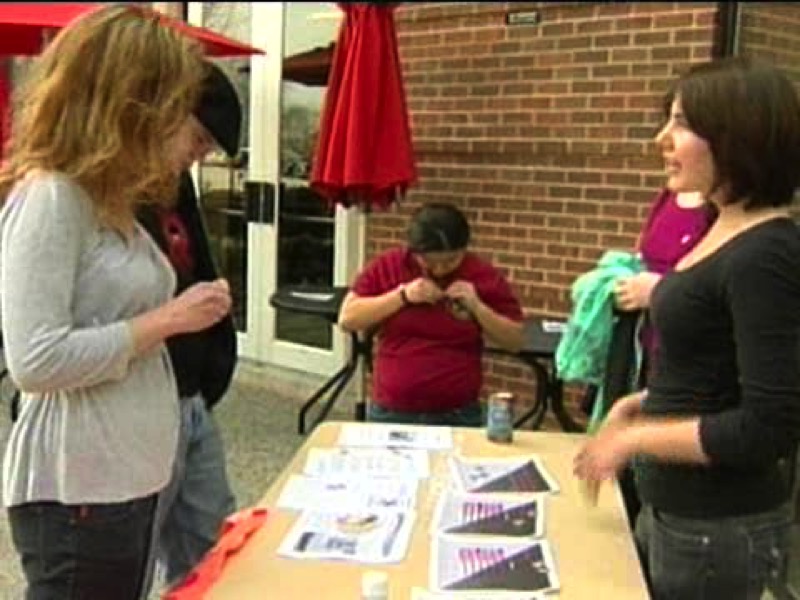
Students at Clark University accuse Coca-Cola of human rights abuses
Cardiff University, UK, "This Funeral Is Brought To You By Coca Cola"
"Here are some photos of the "This Funeral Is Brought To You By Coca Cola" demo which we had on Wednesday 16th April at Cardiff University [UK] as part of our Kick Killer Coke Off Campus campaign.
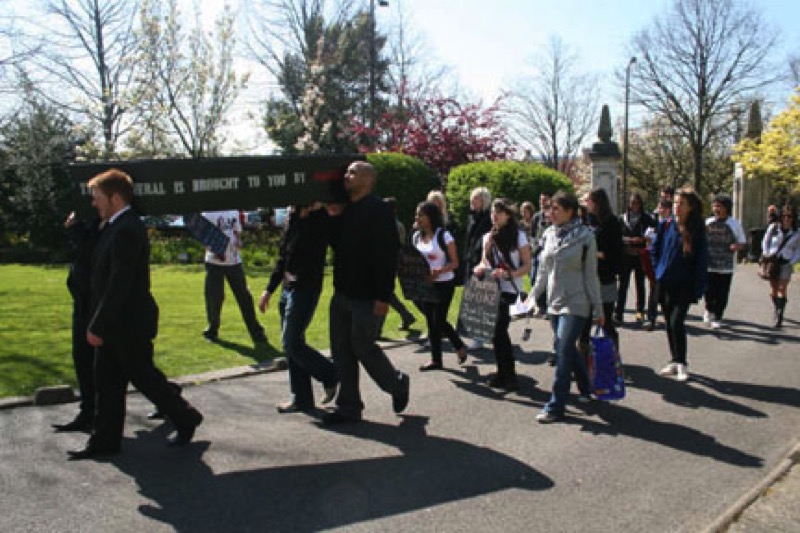
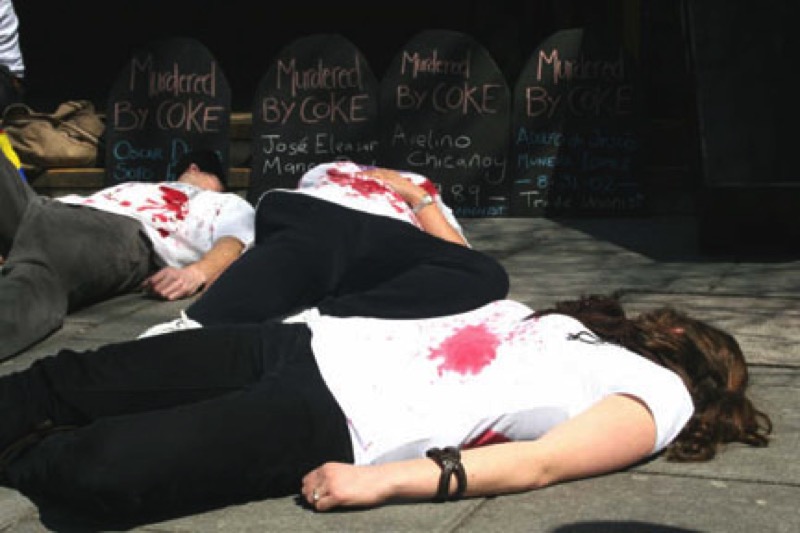
We marched through the main university building, complete with a purpose built coffin, sprayed up with the slogan and tombstones to represent the trade union members who were killed in Colombia. We congregated outside the student union where flyers were handed out — there were a number of interesting discussions with students who pledged their support, but also their ignorance of Coke's crimes. We had around 50 people attend and students taking photos and a film — which I will send on when its been cut. We also had the student union President and Vice President come out to speak to us about our campaign. The Cardiff AGM is in February 2009, which we are building towards. We also intend to replace Coke with Ubuntu.
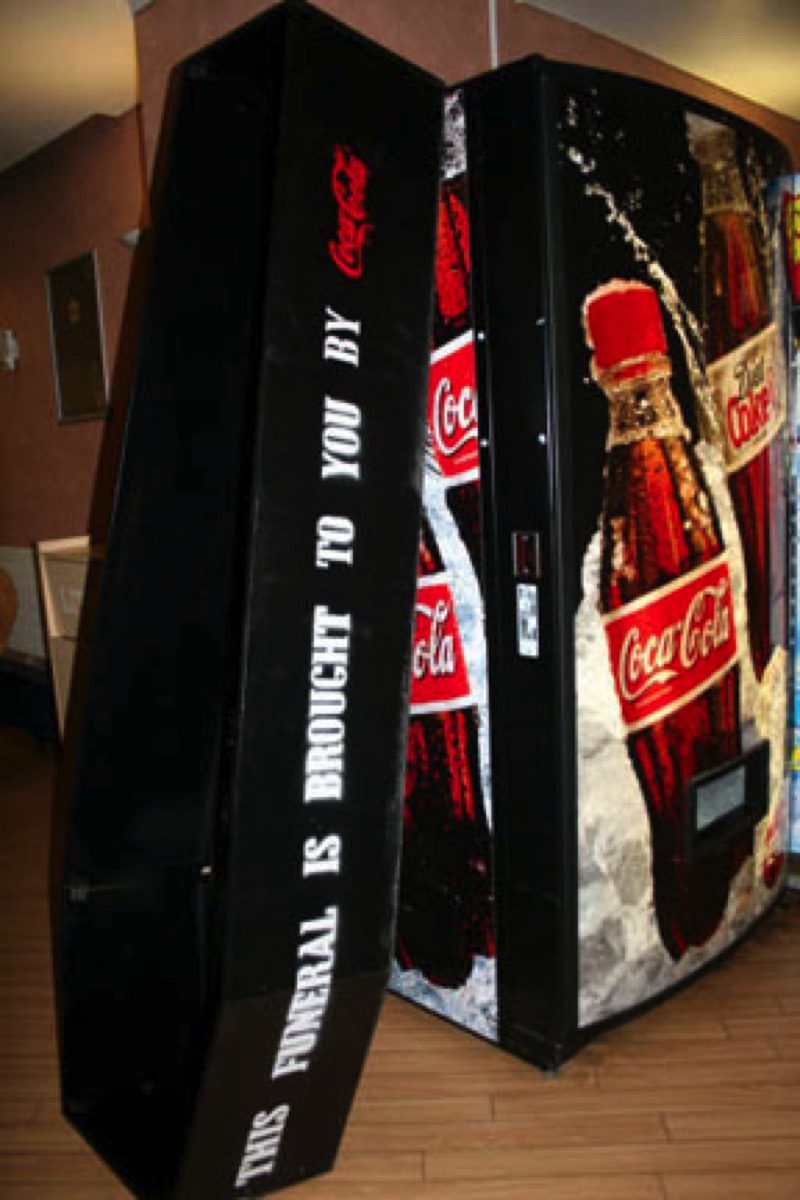
Read the Campaign to Stop Killer Coke on "Coca-Cola, Darfur, Tibet & the China Olympics"
"You are counting money; we are counting lives," shouted Lebsang Choephel to Coke CEO Neville Isdell
Video, "Is this the Coke Side of Life?"
Click here to see "Is this the Coke Side of Life?"
The New York Times, "Coca-Cola Faces Critics of Its Olympics Support," By Stephanie Clifford, April 17, 2008
Read Article
" '"We're not asking Coke to solve Tibet's problems,' Lhadon Tethong, the director of an organizing group called Students for a Free Tibet, told Mr. Isdell at the shareholder meeting on Wednesday. '"We're not asking you to do anything else but tell the I.O.C. this is not the time for the torch to go to Tibet.' Ms. Tethong added, '"You have influence, and you know you have influence. Please don't hide behind a spin.' "
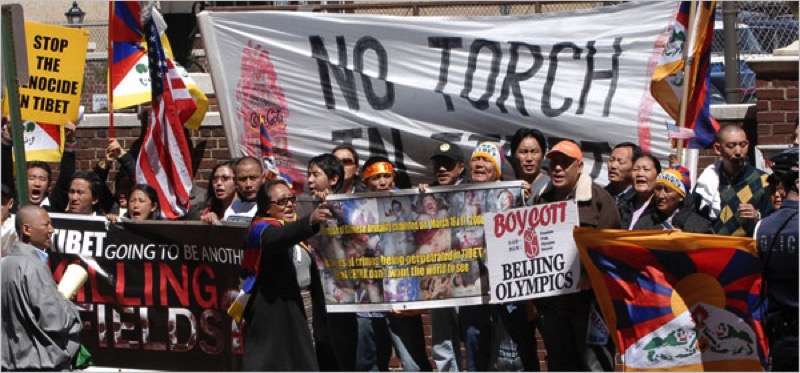
Photo by Bradley C. Bower/Associated Press
Associated Press, "Coke says first-quarter profit rises, supports torch relay," By Harry Weber, April 16, 2008
Read Article
"At Coke's annual meeting, Isdell was interrupted several times by shareholders who questioned the company's business practices in India and Colombia. The company has been accused of depleting water resources in India and not protecting workers in Colombia. Coke has denied the allegations."

Jared Abbott, Campaign to Stop Killer Coke
(AP Photo/Bradley C Bower)
National Nine News, "Olympic protestors target Coke shareholders," April 16, 2008
Read Article
"Outgoing company chairman and chief executive Neville Isdell kept tight control over attempts by several angry shareholders to continue speaking when their time ran out. But he was unable to stop an outburst by Lebsang Choepal who said he had been born in Tibet, lost a brother and brother-in-law who were allegedly killed by the Chinese government for seeking independence for Tibet. A recent crackdown in Tibet by Beijing has fueled worldwide anger and led to protests during the global relay of the Olympic torch with India bracing for anti-China protests when the flame reaches New Delhi on Thursday. Kumar urged Isdell to support a shareholder proposal calling for a special board committee to review human rights violations by Beijing."
The Canadian Press, "Coca-Cola running with Olympic sponsorship despite human-rights turmoil," April 16, 2008
"The Coca-Cola Co. believes the torch relay should continue as part of the run-up to the Summer Olympics in Beijing and it stands by its sponsorship of the event, chief executive Neville Isdell told shareholders Wednesday. Amid concerns about China's human rights record, the torch relay has been disrupted in Greece, Istanbul, London and Paris by protesters opposed to Chinese policies in Tibet. Atlanta-based Coca-Cola is a corporate sponsor of the torch relay."
Atlanta Journal-Constitution, "Coke CEO defends company amid controversy," By Joe Guy Collier, April 16, 2008
Read Article
"It wants Coke to push Olympic officials to alter the torch route so it does not go through Tibet, on its way to Beijing. If the torch goes through Tibet, it will cause more violence, she said. '"Coke will be underwriting bloodshed in Tibet,' Tethong said. 'This is not the time for the torch to go through Tibet.' "
Commondreams, "Is Coke's Dasani Full of Hot Air? Shareholders, Activists Challenge Coke's 'Green' Image," Corporate Accountability International, April 16, 2008
Read Press Release
"Coke has also refused to inform consumers of the source of its Dasani bottled water, even as market leader Aquafina (Pepsi) has agreed to do so. To add salt to the wound, Coke has also continued to drain water in drought prone areas from the southeast United States to India, in spite of community concerns."
India Resource Center, "Coke's Liabilities Increase in India, Shareholders Told," April 16, 2008
Read Press Release
"Coca-Cola shareholders should be extremely concerned that the Coca-Cola company continues to increase its liabilities in India by engaging in unethical practices, shareholders were told at the Coca-Cola annual general meeting in Wilmington today. A recent study funded by Coca-Cola confirmed that the company's bottling plants contribute to severe water shortages around some of its bottling plants in India. The report also recommended the closure of a bottling plant in Kala Dera in Rajasthan and cautioned Coca-Cola on the declining water tables in Mehdiganj in Uttar Pradesh.'
Luis Adolfo Cardona Speaks about Coca-Cola
Luis Adolfo Cardona was witness to the paramilitary death squad murder of Isidro Gil on the grounds of the Coca-Cola bottling plant in Carepa, Colombia. Gil was a leader of SINALTRAINAL in Carepa. Cardona was kidnapped by the paramilitaries, but managed to escape and make his way to the United States.
Luis Adolfo Cardona Speaks about Coca-Cola Part 1
Luis Adolfo Cardona Speaks about Coca-Cola Part 2
Luis Adolfo Cardona Speaks about Coca-Cola Part 3
Washington Square News, "Coke [does not] agrees to investigation, but workers still abused," By Crystal Yakacki, April 10, 2008
"Coke has been claiming for over two years now that the ILO would do an investigation, but the company has yet to even set a timeline or terms for this investigation. In April 2006, the University of Michigan reinstated Coke products on their campus, calling for Coke to complete an assessment of the conditions in by March 31, 2007. Coke missed that deadline, and another year has passed. It is clear that an investigation will not take place even by the ILO, Coke's preferred choice, unless increased pressure is put on Coca-Cola."
Majora Carter Represents "the best of American Citizens" in San Francisco
The New York Times, "Carrying the Olympic Torch, and Protesting It, Too," By John Eligon, April 11, 2008
Read Article
"Coca-Cola, one of the sponsors of the relay, chose Ms. [Majora] Carter, 41, to carry the torch in San Francisco, its only United States stop, because of her environmental activism. Ms. Carter started an environmental action group, Sustainable South Bronx, in 2001...Five seconds into her run down Van Ness Avenue, Ms. Carter pulled the Tibetan flag from her sleeve and began waving it. There she was, a mole at the head of the procession."

Daily News, "China protester is torched by critics, "By Soo Youn and Bill Hutchinson, April 11, 2008
Read Article
"The brainy South Bronx activist [Majora Carter] who stirred an Olympic torch-bearing ruckus in San Francisco said Thursday her conscience fueled her surprise anti-China protest...'I figured it would not be smiled upon, but I thought it was freedom of expression,' said Carter, 41, a 2005 recipient of a prestigious MacArthur genius grant. 'As a civil rights activist in this country, I could not have these privileges and not use them,' Carter told the Daily News.
Columbus Indymedia, "Debate: Students Against Coke vs Coca-Cola," Ohio State University, April 3, 2008
Listen to Debate
"This is a modern day 'David vs. Goliath' story. Coca-Cola has refused to have a professional vs. professional debate. They will only debate their professionals vs. the non-killercoke student professionals! And the post-debate report is... SUCCESS!!! Students Against Coke soundly defeated Coca-Cola's public relations reps!"
The Ticker, Baruch College, City University of New York, "Baruch plays kick the (Coke) can," By Anna Aulova, April 7, 2008
Read Article
"According to Under Graduate Student Government President Anthony Hernandez, the chairperson for University State Senate, Robert Ramos, will be visiting Baruch soon to discuss the Coca-Cola boycott, which will ultimately decide the future of Coca-Cola products on campus. 'If the USS, which has the primary say on campus activities, votes to kick the product off campus, Coca-Cola products will not be welcome here any longer,' he explained."
Graduate Student Organization, University of Albany, SUNY, "RESOLUTION REGARDING THE COCA-COLA COMPANY," April 4, 2008
Read University of Albany Resolution
"...resolved that the Graduate Student Organization support the efforts of the UUP in pressing for the termination of contracts with Coca-Cola on campus."
Read UUP Resolution
"...BE IT RESOLVED that the UUP Delegate Assembly recommends to the statewide UUP Executive Board that UUP not serve Coca-Cola products at its events, meetings, conferences, and delegate assemblies,"
Channel 10 News (Ohio), "Student Group Wants Ohio State To Dump Coca-Cola Contract," By Brittany Westbrook, April 3, 2008
Read Article
"Harry Lindner, who was a member anti-Coca-Cola group, said the company abuses human and worker rights in places like India, Colombia and El Salvador. 'It's not just about getting rid of Coca-Cola," Lindner said. "It's about cleaning up business practices that are wrong. It's about treating the community with respect.' Eddie Klatka, also a member of the group, said that Coca-Cola exploits children in El Salvador. 'Right now they are using children in sugar cane fields, which most people think child labor is,' Klatka said."
The Free Press, "Ohio State students call on political leaders to help oust Coke from OSU," By Students Against Coke, Ohio State University, April 3, 2008
Read Article
"OSU is believed to have the largest single university contract in the nation. That contract expires in June. It has been reported that in an exclusive contract arrangement, OSU has received $30 million over the past 10 years. It was also reported in 1999 that Coke received $29 million in revenues in just the first year of the contract. In addition, Coke benefits from free advertising and promotion of its brand name throughout the campus and at sports and other events."
On this 40th anniversary of the assassination of Dr. Martin Luther King, Jr., we are linking to his "I've Been to the Mountaintop" speech delivered on April 3, 1968, the night before he was shot, in which he called on the people of Memphis to boycott Coca-Cola because "they haven't been fair in their hiring policies." It should be noted that in 2000, more than three decades later, Coke settled a lawsuit for $192.5 million brought by their African-American employees charging racial discrimination and there are similar lawsuits pending.
Dr. Martin Luther King, Jr., "I've Been to the Mountaintop," April 3, 1968
Read and Watch a Video of Dr. King's Speech
"Always anchor our external direct action with the power of economic withdrawal...And so, as a result of this, we are asking you tonight, to go out and tell your neighbors not to buy Coca-Cola in Memphis...As Jesse Jackson has said, up to now, only the garbage men have been feeling pain; now we must kind of redistribute the pain. We are choosing these companies because they haven't been fair in their hiring policies; and we are choosing them because they can begin the process of saying they are going to support the needs and the rights of these men who are on strike."
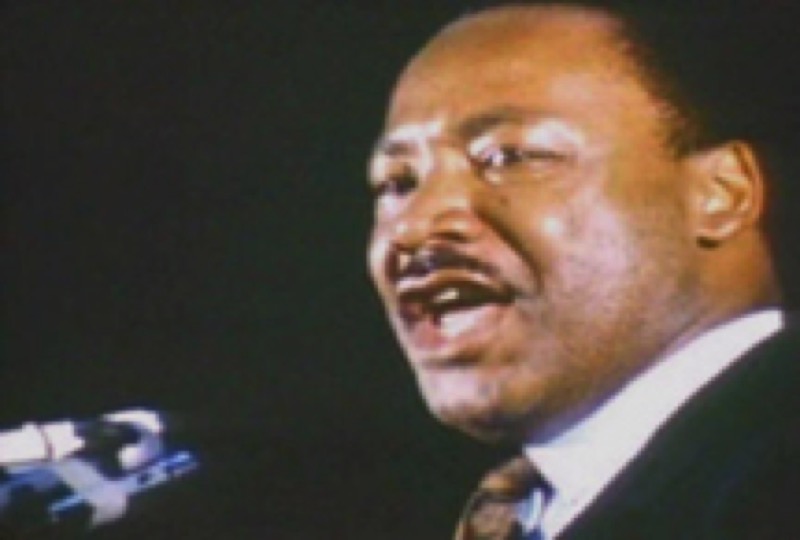
Scoop World Indendent News, "Major Protest Demands Coca-Cola Shut Down Plant," India Resource Center, March 31, 2008
Read Article
"Over 1500 villagers marched to the Coca-Cola company's bottling plant in Mehdiganj in Varanasi in India yesterday demanding that the bottling plant shut down immediately...'Coca-Cola, Pepsico and other companies are plundering our natural resources. Water sustains life, and without water, life in not sustainable. The time has come to put an end to the misguided expropriation of our natural resources and assert the right to water to the communities to whom it belongs,' said Medha Patkar of the National Alliance of People's Movements, who led the march and rally."
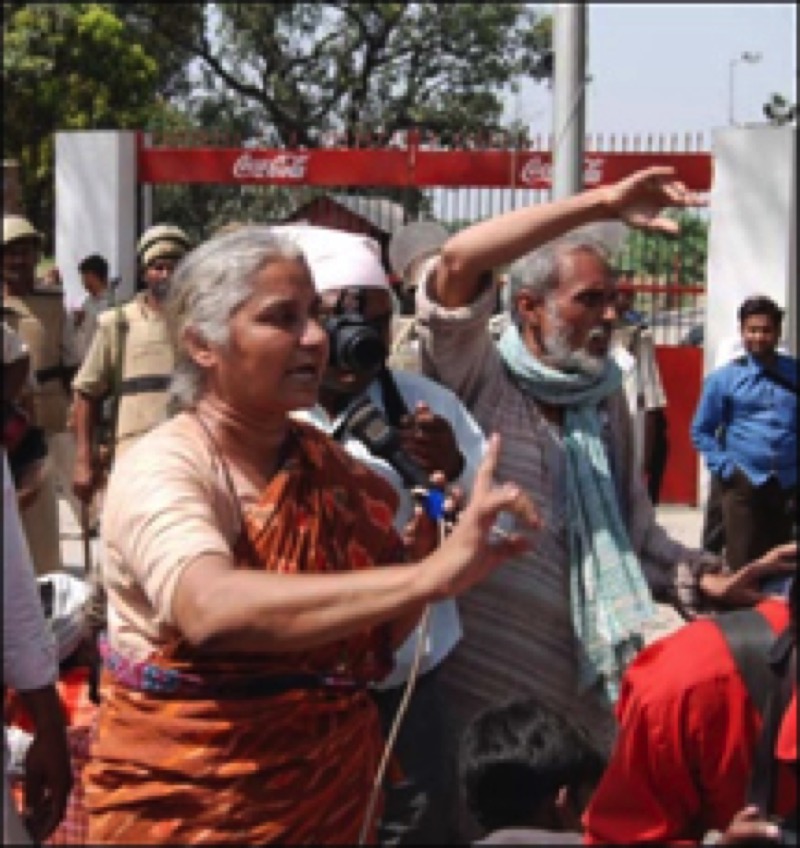
Zee News, "The Olympic torch: Its history and past disputes," March 31, 2008
Read Article
"* 2006: Protests in Italy force torch bearers for Turin`s Winter Olympics to change route four times during a two-month trip across Italy. Protesters voice opposition to U.S. corporate giant Coca Cola`s sponsorship of the Games, US First Lady Laura Bush`s related visit and the construction of a high-speed railway from Turin to France.
"* March 2008: Human rights protesters try to disrupt the torch-lighting ceremony in Greece on March 24. Exiled Tibetans pledge to demonstrate against a security crackdown in Tibet and parts of western China after a wave of anti-government protests. China says there are no plans to change the torch`s two scheduled visits to Tibet."
Wikipedia, International Route of the Olympic Torch
See Schedule
Emirates Business 24/7, "Sponsors face heat in Beijing," March 28, 2008
"McDonald's, Coca-Cola, Samsung and other sponsors paid tens of millions of dollars to link their names with the Beijing Olympics. Now, they're trying to mollify activists pressing for change on Tibet, Darfur and other issues, without angering China. They have expressed concern over Tibet; some even talk privately to Beijing organisers. But sponsors insist they should stay out of politics.
"Until last week, the sponsors' biggest concern was pressure over Darfur. Fronted by actress Mia Farrow and employing disciplined public relations strategies, Darfur activists have been prodding sponsors to lobby Beijing to help pressure Sudan to end the conflict."
Read the Campaign to Stop Killer Coke on "Coca-Cola, Darfur, Tibet & the China Olympics"
The New York Times, "Corporate Sponsors Nervous as Tibet Protest Groups Shadow Olympic Torch's Run," By Heather Timmons, March 29, 2008
Read Article
"Groups have decried China's policies in other areas, particularly Darfur. But the pro-Tibet network, spread around the world, is more organized and interconnected than other groups, and advertising consultants and political scientists, say its influence is expected to keep the issue of autonomy and violence in Tibet front and center for weeks...'We feel that using the torch relay to put political pressure on China is not appropriate, Ms. [communications manager for Coca-Cola, Kerry] Kerr said. Still, Coke has had several meetings with protest groups, she said, and is sharing the groups' concerns with the International Olympic Committee."
However, iIt should be noted that large Coke shareholder B. Wardlaw predicted this problem four years ago at the 2004 Coke shareholders' meeting: "As far as my proposal on China business principles which I am bringing to you for the third time [His proposal was voted down all three years by the shareholders.], I introduced this proposal because I, along with many other socially conscious shareholders, are concerned about Coke, its reputation and its share price. As I've said here the last two years, we seem to be heading toward possible public relations calamity in China. So just looking at it from the viewpoint of the company, it makes sense for us to spend more time thinking about, before we go in, we're spending over a $1 billion, what over the last 20 years in China, developing products there. The Olympics are coming to China in 2008 in Beijing. This is a moment where Coca-Cola is going to be highlighted because of our close involvement with the Olympics and the, as someone has said, as a recognized product in the world. I think what is happening, is that we are still not, as a company, paying enough attention to what could happen in China. Every human rights abuse possible has been committed in China..."
Daily Echo Dorset, "Opinion split on Olympic boycott," By Joanna Codd, March 25, 2008
Read Article
"Former international sportsman Derek Vaines, 71, of Bournemouth, who represented his country at judo, said: 'Athletes shouldn't go to China. Its human rights record is deplorable. All China is going to do with the Olympic Games is wave its own flag and proffer its own position. If I was in my twenties and competing at an international level, I certainly wouldn't be entertaining going on any sort of game-playing exercise in Beijing.' Mr Vaines urged other people to join his boycott of products made by Coca-Cola, which is sponsoring the Olympic torch."
Read Campaign to Stop Killer Coke on "Coke, Darfur, Tibet & the Chinese Olympics"
"The Coca-Cola Co. has recently come under criticism due to its involvement as a major sponsor of the 2008 Olympic games in China because China supports the Sudanese government and because of the Chinese government's violence directed at Tibetan protestors. Coca-Cola long-time board member Peter Ueberroth is the chair of the U.S. Olympic Committee...
"Sponsorship for the torch relay is separate from the Games itself and usually costs about $15 million to $20 million, say people in the industry. Torch sponsors can spend an equivalent amount building marketing campaigns around the relays. Coca-Cola, a six-time torch sponsor, with an abominable record on labor, human rights and environmental issues, is not about to allow human rights protests to undermine its marketing efforts. "Most company sponsors said it wasn't their role to advise China on political policy..." reported the Wall Street Journal (3/17/08).
Stop Killer Coke: Unmasking the Corporate Image
Watch Video by clicking here or on video above
India Resource Center, "Coca-Cola's Own Report Implicates Company for Abuses in India," by Amit Srivastava, March 13, 2008
Read Article
AlterNet, "Coke and Pepsi's New Marketing Strategy: Pull at Your Heart Strings," By Richard Girard, Polaris Institute, March 14, 2008
Read Article
"'Numerous media and industry reports are saying that sales of bottled water are slowing as a result of campaigns targeting the product's environmental and social impact. In a recent article, Brandweek declared that Pepsi and Coke are facing 'evaporating sales growth for bottled water and increased concerns about their products' impact on the environment.'
"Marketing trade publication Brandweek predicts that Coke and Pepsi will fight the growing backlash against bottled water with intense "ethical" or "'responsible" marketing, understood as tying the purchase of a product to charitable activities. A number of ad campaigns for bottled water already include charitable ties. According to Brandweek, the use of A-list celebrity endorsements of these types of campaigns is likely to increase."
WCAX-TV News, "UVM Students Want Coca-Cola Off Campus," By Bianca Slota, March 6, 2008
Read Article
"UVM is a campus full of Coca-Cola products, including Coke, Dr. Pepper, Vitamin Water and Odwalla bars. Justin Hurtt, who is leading up the effort to kick Coke off campus, says other students are frequently surprised to learn just how many products are made by the Coca-Cola company. He says getting them to give up the products might take a bit of convincing, but he's sure it can be done.
" 'I believe we can be able to do that here at the University of Vermont,' says Hurtt. 'I believe that we should if we want to hold up to our code of conduct and be able to promote ourselves as a progressive and a sustainable college.' "
Indiana Daily Student, "No Sweat! protests against Coke," By Sarah Hutchins, February 13, 2008
"After six years of marching, chalking and petitioning, members of No Sweat! are optimistic about their campaign to kick Coca-Cola off campus.No Sweat! is the IU chapter of United Students Against Sweatshops, a student group working to combat sweatshops and corporate globalization at a local level.
"In the group's most recent campaign, members are protesting the University's contract with Coca-Cola in response to allegations that the company has been using torture, murder and kidnapping to intimidate their workers at a bottling plant in Colombia, said junior Cole Wehrle, a No Sweat! member. Group members said they believe if the school discontinues its contract, it can send a powerful message to the company."
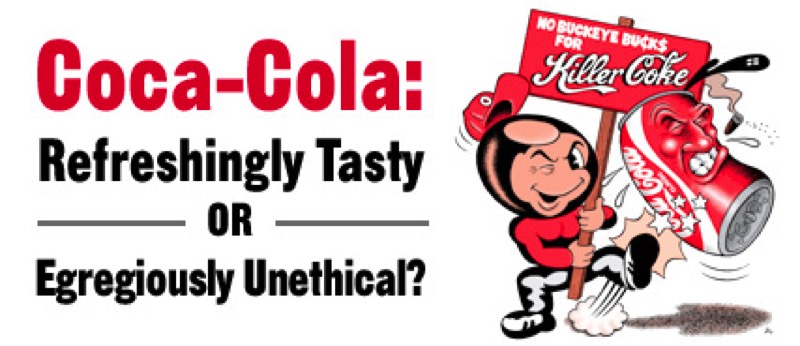
UWeekly cover story (re: Ohio State University Killer Coke Campaign), "Coca-Cola: Refreshingly Tasty or Egregiously Unethical?" By Bram Fulk, March 5, 2008
Read Article
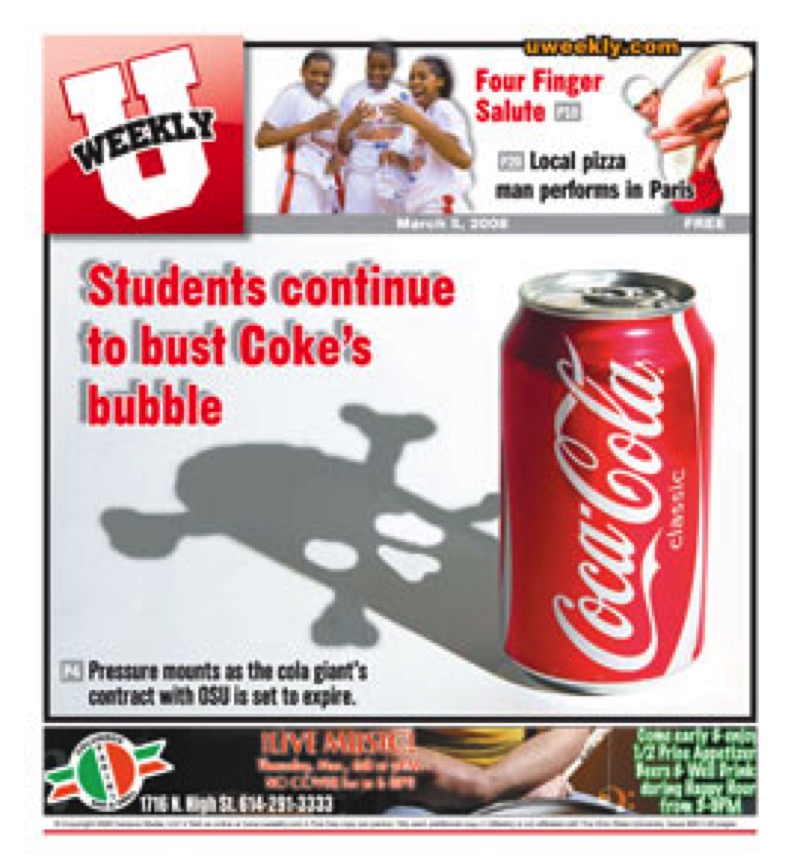
"Just to recap, there have been numerous allegations of serious human rights violations leveled against Coke over the years. These criticisms range from racial discrimination and monopolization to health hazards and even questionable connections to Nazi Germany. However, some of the most serious and most publicized affairs deal with the company's practices in the countries of Colombia, India, and El Salvador."
From Archive
UWeekly cover story (re: Ohio State University Killer Coke Campaign), "Killer Coke?:Student to spill Coke secrets on university senate," By Jocelyn Beach Sexton, May 9, 2007
Read Article
" 'I first heard about [Coke's business practices] when my brother studied abroad in Colombia,' [Chris] Trout said. 'He spoke to a Coke employee there who was part of a union. One of his family members was kidnapped because of this [union participation], and he was forced to leave the union, or else. This happens all the time down there.' "
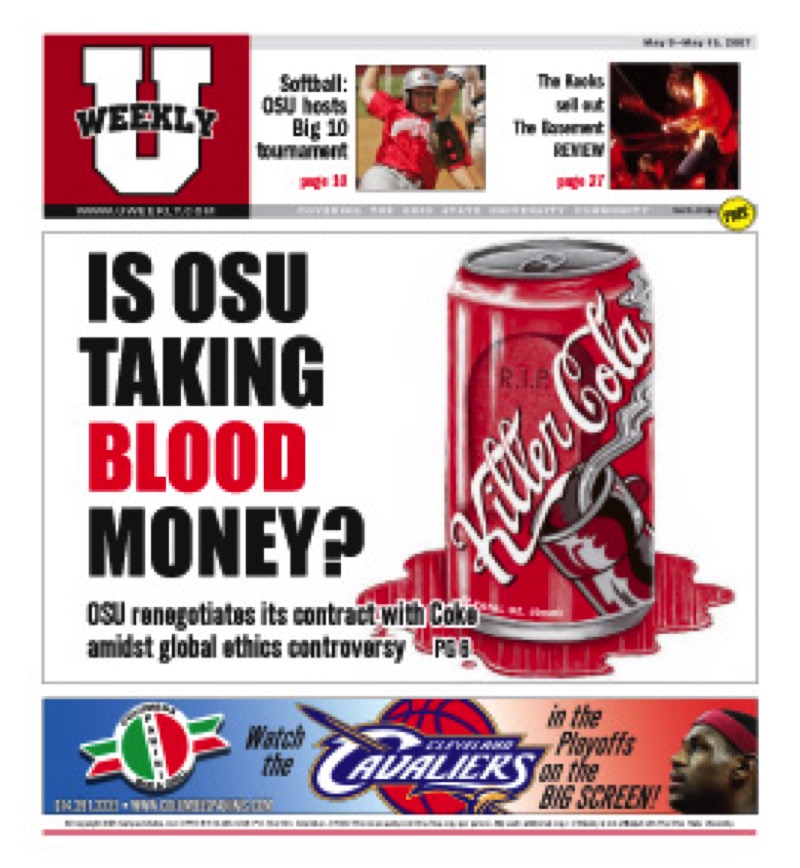
The Oberlin Review, "Honest Tea Vacates DeCafe Shelves Due to Coca-Cola Ban," By Sam Jewler, February 29, 2008
Read Article
"Now, one more brand name has been added to the boycott list. On February 5, Coca-Cola purchased 40 percent of Honest Tea, making it the most monetarily influential shareholder of the 10-year-old tea company...But the Honest Tea era at Oberlin is now a thing of the past. On Sunday, Feb. 24, the five flavors of Honest Tea were evicted from their home in the DeCafe refrigerators. They have been replaced by five styles of TEAS' TEA, a zero-sugar, zero-calorie brand produced in Japan."
Cleveland Plain Dealer, "OSU's Coke at risk?," By Janet Okoben
"Coca-Cola has been the target of a boycott at Oberlin College since 2005, and now a national group is trying to rally Ohio State University students to pressure administrators to get out of a Coke contract there.
"A group called Students Against Coke has formed in Columbus, and last month about 100 students showed up for a meeting there. Ray Rogers, director of the New York-based Campaign to Stop Killer Coke, said he and other organizers are hoping to have several more meetings before a contract between Coke and OSU expires in June.
"The group says Coke has environmental and human rights issues in Colombia and India. A spokeswoman for Coke told OSU's student newspaper that the claims are taken out of context and said government agencies have found no truth to other claims.
"Shelly Hoffman, an OSU spokeswoman, said the current contract, which expires June 30, is a $30 million, 10-year contract.
"In exchange, Coke provides "cash and services" to the university and student groups."
"Right to Water National Conference and Protest Against Coca-Cola" will be held at Mehdigani of Uttar Pradesh from March 28 to 30
MyNews.in, "Right to Water National Conference at Mehdigani," By Ch. Narendra, March 3, 2008
Read Article
"Nandlal Master, Lok Samiti, Mehdiganj and Sandeep Pandey and National Alliance of Peoples Movements said, 'We demand community centred solutions to the water crises and insist that communities must have primary rights over water.' The community of Mehdiganj and Coca-Cola affected communities in India are working with communities, elected officials, local, state and national government officials, people's movements, non-governmental organizations and international groups to challenge the eroding right to water and asserting the fundamental human right to water."
Fox Central Oregon, "Teamsters at Coca-Cola Stand Strong for Health Care," March 1, 2008
"We will not have our members pay high costs for health care while Coca- Cola still gives out fat consulting agreements to executives who no longer work for the company," said Jack Cipriani, director of the Teamsters Brewery and Soft Drink Workers Conference. "Our members are loyal, hard working people who deserve excellent health care and good wages. We are here to fight for them."
The Capital Times, "We must help Darfur, Mia Farrow tells teachers here," By Susan Troller, February 23, 2008
"Is this a conflict of interest by Peter Ueberroth?
"'Boycott the opening of the Olympics. Contact the sponsors. Tell Coca-Cola you're switching to Pepsi, or tell McDonald's you're going to eat at Burger King,' she [Mia Farrow] said. Other sponsors she cited included Budweiser and UPS.
"But U.S. Olympic Committee chair [AND ONE OF 13 MEMBERS OF THE COCA-COLA CO. BOARD OF DIRECTORS] Peter Ueberroth said in Atlanta recently that he wants American athletes to focus on being good guests, not outspoken reformers, according to an Associated Press story.
independentmail.com, "Letter writer was lobbyist in disguise," Letter to Editor from Andrew Hammett, February 22, 2008
Read Letter
Is this conflict of interest by Whitefield?
"Her [Trice Whitefield, Center for Consumer Freedom] letter seemed to completely miss the point of the editorial, and instead took the ludicrous position that each individual is immune to peer pressures, mass marketing and other cultural effects that shape our eating habits.
"It doesn't surprise me that Ms. Whitefield espoused such a narrow-minded worldview: She's being paid to push it. You see, the Center for Consumer Freedom receives their funding from companies such as Coca-Cola, Wendy's, and Outback Steakhouse."
Washington Post, "Human RIghts, and Wrongs," By Sally Jenkins, February 22, 2008
Read Article
"But American corporate executives will find it less easy to cop [International Olympic Committee President Jacques] Rogge's plea of ineffectuality, and they certainly can't plead that they are 'apolitical.' Seven of the top 12 Beijing Games sponsors are American, and they have poured money into the event in return for Olympic-sized access to the Chinese market. You should know who they are: Visa, Kodak, Johnson & Johnson, McDonald's, General Electric, John Hancock and Coca-Cola."
Alternet, "It's Time for the UN to Make Water a Human Right," By Maude Barlow, February 21, 2008
Read Article
"A Covenant on the right to water would serve as a common, coherent body of rules for all nations and clarify that it is the role of the state to provide clean, affordable water to all of its citizens. Such a Covenant would also safeguard already accepted human rights and environmental principles...No country needs to be held more accountable to this crisis than the United States. Many of the companies privatizing water are based in the United States and the United States is among the chief backers of the privatization strategy through the World Bank and other mechanisms. If we are to stop this crisis, the United States government must become part of the solution, not the problem."
The Vermont Cynic, "Students trying to remove 'killer' Coke: Students for Peace and Global Justice work to prevent renewal of UVM and Coca-Cola's contract because of 'human rights abuses'," By Vermont Cynic News Staff, February 19, 2008
Read Article
Students for Peace and Global Justice are working to make sure that UVM buys products from companies who follow its ideals of ethical and environmentally sound practices. However, they are currently working to remove Coca Cola from the UVM campus. Students for Peace and Global Justice have joined the US campaign against Coca Cola called 'Killer Coke'."
Join a new Facebook group in the UK
UK "Join and pledge to BOYCOTT COCA-COLA!"
Video, "Coca-Cola Kills"
Click here or above to see the video
"A video about how coke kills workers in Colombia and harms everyone who drinks their products. Music by NOFX."
theStreet.com, "Filtered Water: Tastes Great, Less Land-Filling," By Eileen Gunn, February 21, 2008
Read Article
"Moreover, various taste tests have shown that a lot of people actually prefer tap water to the store-bought stuff. And there is a use-or-lose-it aspect to tap water. The best way to ensure that we continue to have potable water — when so many around the world don't — is to keep drinking it. Relying on public water spurs us to care about it and to keep tabs on the municipal authorities that monitor both it and the pipes it travels through to our homes."
The Guilfordian, "Guilford plans to drop Coca-Cola, Starbucks, and Nestle," By Eric Ginsburg, November 30, 2007
Read Article
"Coca-Cola has been widely criticized for their alleged involvement with the assassinations of over half a dozen union leaders who worked at Coke's bottling plants in Colombia. Since 1990, Coke continues to deny any connection to the eight murders. In addition, the Coca-Cola Company is one of the three largest water privatizing entities in the world, restricting access to water and allegedly poisoning local water supplies around their plants in India."
Hawaii Rporter, "Banning Aspartame - A Common Sense Precaution,"By Sen. Jerry Ortiz y Pino (New Mexico), February 10, 2008
Read Article
"Coca-Cola has changed 180 degrees from its position on aspartame in 1980. At that time it testified in opposition to aspartame's approval at FDA hearings looking into the safety of it. Now they help finance its defense. Of course, the FDA itself has flipped. Its initial denial was reversed a few years later in 1983, when Donald Rumsfeld (ring a bell?) persuaded the Reagan administration that denial was not bad chemistry but bad politics. At that time Rumsfeld headed Searle, the pharmaceutical firm that helped develop aspartame."
TERI Report on Coke in India: An Attempted Whitewash Gone Awry
To a corporate giant like The Coca-Cola Company, $2 million is insignificant pocket change - literally a drop in the ocean of money it extracts from the worldwide markets where its overpriced, often unhealthy beverages are sold.
So, did Coca-Cola get its money's worth when it paid a New Dehli-based think tank $2 million for a "third-party assessment" of the environmental havoc it has wreaked in India?
"From a PR standpoint, which has always been Coke's concern, it appears they did," said Ray Rogers, director of the Campaign to Stop Killer Coke. "At the same time, it confirms Coke's gross misconduct with water management problems and how they caused environmental damage they've been denying for years."
The report by The Energy and Resources Institute (TERI), 16 months in the making, noted that while the plants it evaluated — only six of more than 50 Coke operates in India - may have met some government regulatory standards, most did not achieve the wastewater standards set by the company itself because of "presence of faecal coliform and several other physico-chemical pollutants in the treated wastewater."
TERI ignored, for reasons never explained, the Coke bottling plant in Plachimada, Kerala, that has been shut down since March 2004 after massive protests by activists from surrounding farms and communities devastated by water scarcity and pollution.
However, the report said a watershed at Kaladera, Rajasthan, where one plant is located, has been so "overexploited" that Coke should consider relocating the plant or shutting it down.
Misleading headlines (like "Coke Makes Cleanup Gains" in The Wall Street Journal) helped Coke apply its PR spin to the TERI story, but no amount of glib interpretation can hide the fact that Coke continues to cause devastating local water shortages.
The report notes, for example, that Coke's choices on where to site their plants are "strictly business" decisions that cause great distress to local communities. It bluntly states that "community water issues do not appear to form an integral part of the water resource management practices of The Coca-Cola Company."
It even points out that the company hampered TERI's assessment by refusing to share the environmental impact assessments for any one of the six plants.
Perhaps most noteworthy of all, it validates the main concerns of protestors about water scarcity and pollution. "In general, the community perceptions were found in conformity to the results obtained from the detailed technical assessment of groundwater resources," the report said.
Coke may claim to have been vindicated on the issue of pesticides since TERI said it detected none in the water at the six plants, despite Indian environmentalists' finding that showed dangerous levels in Coke drinks. But Coke is still doing its best to downplay or conceal the fact that TERI tested only water, not Coke products
According to the Center for Science and Environment (CSE), headed by Sunita Narain, who won the 2005 Stockholm Water Prize, Coca-Cola could not be described as pesticide-free, because only the water had been tested and not the rest of the ingredients. A CSE statement said: "TERI has not tested the final product, which we drink. The CSE study in 2003 and 2006 tested bottles of colas and found pesticides above safe limits in the drinks."
"Coke's ability to influence the timing and media analysis of the TERI report made it well worth the company's piddling $2 million investment," said Rogers. "They wouldn't pay two bucks for a report they couldn't see first and sanitize as much as they could."
The University of Michigan and Coca-Cola agreed to commission the TERI report after students argues that Coke's water-management practices violated the university's code of conduct for vendors. UM was among the largest of more than 46 colleges and universities that removed Coke products from campuses because of flagrant corporate irresponsibility overseas, particularly in India and Colombia.
Lawsuits filed in 2001 and 2006 by the International Labor Rights Fund and the United Steelworkers Union, AFL-CIO, charging Coke bottlers' complicity with Colombian terrorist-paramilitaries who have kidnapped, tortured, illegally detained and murdered members of the SINALTRAINAL union, are proceeding — and so are the students, labor and environmentalist protests that TERI's report utterly fails to quell.
India Resource Center, "New Report Highlights Coca-Cola's Shortcomings in India," January 21, 2008
Read Press Release
'The report by TERI is a damning indictment of Coca-Cola's operations in India. The report takes the company to task for siting its bottling plants in already water stressed areas, without much thought given to the impacts on communities. The report also validates the concerns of water scarcity and pollution that have been raised by communities in Kala Dera, Mehdiganj as well as others. A list of Coca-Cola's shortcomings, according to the report, follows this press note."
The Hindu, "Coca-Cola claims questioned,"January 17, 2008
Read Article
"He [R. Ajayan ofThe Plachimada Samara Aikyadartya Samithi] said Coca-Cola's decision to get a 'third party study' done by an institution that 'enjoyed its sponsorship' had created a lot of protest in the country. Even so, the report of the Delhi-based TERI, released on Tuesday, did not give the company a clean certificate as was being made out by 'propagandists.'"
The New York Times, Coca-Cola Urged to Close an Indian Plant to Save Water," By Amelia Gentleman, January 16, 2008
Read Article
"A leading environmental research group based here has asked Coca-Cola to consider shutting down a bottling plant in the drought-stricken state of Rajasthan, saying that the plant is depleting scarce water supplies."
IndiaPost.com, "TERI calls for closure of Coca-Cola plant," January 16, 2008
"In a major blow to the Coca-Cola company in India, a report by its ally, the Energy and Resources Institute (TERI), has called for the closure of one of its bottling plants in India - in the village of Kala Dera in the state of Rajasthan. Citing the widespread water shortages being experienced by villages around Coca-Cola's bottling plant, the report by TERI recommends that either the Coca-Cola bottling find alternative sources of water - a highly impractical option - or either relocate or shut down the plant altogether."
The Economic Times, "TERI report not a clean chit to Coke: Plachimada Council," January 15, 2008
Read Article
"In a statement here, council convenor R Ajayan said TERI's 500-page report had not made any suggestion of a clean chit, though the report was an attempt to hide certain facts and `whitewash' the company's operations.
"The Plachimada Coke plant, which could not operate for the last four years following locals' agitation was left out from the purview of the study. The report was silent on why the plant at Plachimada and the one at Ballia in Uttar Pradesh had to suspend their operations.
"The Coca-Cola company's attempt to regain its lost credibility had once again failed, Ajayan said. The company should explain to the people why Plachimada was not included in the study conducted by TERI, he added."
International Environmental Law Research Centre, "Legal Implications of Plachimada: A Case Study," By Sujith Koonan, May 2007
Read Report
"The deterioration of groundwater in quality and quantity and the consequential public health problems and the destruction of the agricultural economy are the main problems identified in Plachimada. The activity of the Coca Cola company has caused or contributed a great deal to these problems. The people living in the vicinity of the Company have been suffering these problems for the last few years. The availability of good quality water for drinking purposes and agriculture has been affected dangerously due to the activity of the Company. Apart from that, the Company had also polluted the agricultural lands by depositing the hazardous wastes. All these points to the gross violation of the basic human rights, that is, the right to life, right to livelihood and the violation of the pollution control laws."
The Lantern, "Coca-Cola under serious scrutiny," By Briony Clare, January 18, 2008
Read Article
"Students Against Coke sponsored a forum, "Coke and You," Wednesday night that accused Coca-Cola of human rights violations in Colombia, the exploitation and pollution of water sources in India and other environmental and ethical infractions. Coca-Cola declined an invitation to the event, saying they refused to put themselves "in a public forum with professionals ... with false information and graphic videos." A company representative denied all accusations made by SAC.
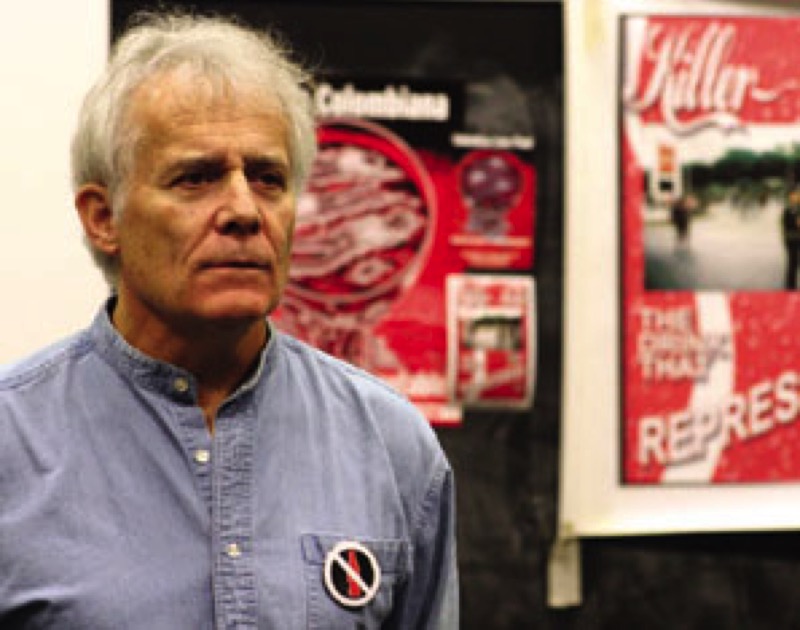
Photo by Hope Moore, The Lantern
The Lantern, "Coke offers more than empty calories," By Harry Lindner, January 16, 2008
Read Opinion Piece
"I was at first skeptical of the accusations he [OSU Student Eddie Klatka] made against Coca-Cola. He said the corporation 'has a laundry list of human rights and worker's rights violations extending around the world,' that, in India, Coke is 'continually polluting villages, where their bottling plants are located, with toxic waste' and that, in Colombia, union leaders have been killed or threatened with murder. This all sounded very serious and far-fetched, so I did some independent research..."
The Lantern, "OSU should can Coke deal," By Eddie Klatka, November 21, 2007
Read Opinion Piece
" 'As a 21st century land-grant university, The Ohio State University will set the standard for the creation and dissemination of knowledge in service to its communities, state, nation and the world. Our faculty, students and staff will be among the best in the nation. [OSU's Mission Statement]' How then are we, OSU students, faculty and staff, able to allow a contract with corporations, such as Coca-Cola, whose business practices are unethical and immoral? The Coca-Cola Corporation has a laundry list of human rights and worker's rights violations extending around the world. The countries of India and Colombia are most affected by Coca-Cola's actions. This article is to inform the OSU community about the dangers of re-signing the contract between the university and the Coca-Cola Corporation."
Videos on Coca-Cola's Abuses
Matt Beard, A Justice Film, "The Cost of a Coke"
"The Cost of a Coke," Part 1
Watch on YouTube
"The Cost of a Coke," Part 2
Watch on YouTube
"The Cost of a Coke," Part 3
Watch on YouTube
Prelude 12/21 - Killer Coke, UK
Click above or here to watch this video
My Killer Coke Campaign Video, UK
Boycott Killer Cola, Germany
Click above or here to watch this video
Boycott Killer Cola-2, Germany
Click above or here to watch this video
The Calgary Times, "Water bottles the latest 'in' accessory," George Pandi,January 18, 2008
Read Article
"The naives eschew tap water either because of snobbery (a water that anyone can drink isn't exclusive) or because they worry about the purity of the city's pipes. They choose bottled water that — under the same regulations as packaged food — is checked by the Canadian Food Inspection Agency probably not every week or even month. I trust municipal tap water that's analyzed every 45 minutes. It's so good, the Coca-Cola people make Dasani from municipal water. They filter it some, then add minerals for flavour. Their fake water costs 3,000 times more than what flows from the wall."
Novosti (Russian News & Information Agency), Russian Orthodox Christians protest against Coca-Cola ads," January 17, 2008
Read Article
" 'Coca-Cola uses all these Orthodox symbols in a blasphemous way by placing images of Coca-Cola bottles inside the pictures,' the letter said. 'Some [church] images are deliberately turned upside down, including the crosses.' "
EARTHtimes, "Coke agrees to remove offending ads," January 18, 2008
Read Article
" 'Coca-Cola uses all these Orthodox symbols in a blasphemous way by placing images of Coca-Cola bottles inside the pictures,' protesters said in a letter to local officials last month. They said some church images were deliberately turned upside down, including the crosses."
CSPI Newsroom, "Consumer Groups in 20 Countries Urge Coke, Pepsi to Limit Soft Drink Marketing to Children: Cola Promotion in Elementary School Physical Activity Program Cited"
Read Article
"The group, at a press conference in Mexico City on December 10, exposed an elementary school nutrition campaign sponsored by Coke that portrays Coca-Cola as one of several beverages that can be used for hydration after physical activity. The campaign's organizers are urging consumers around the world to alert them to similarly misleading marketing efforts by Coca-Cola or PepsiCo in other countries."
The Global Dump Soft Drinks Campaign
Read How Coca-Cola Secretly Advertises to Kids
Coalition Letter to Coca-Cola
Union-Tribune, "Wondering 'Who really is Joe Louis?,' playwright Steve Drukman used two classic fights as a springboard for his imagination," By Anne Marie Welsh, January 3, 2008
Read Article
" 'Hitler,' or at least 'Hitler's boy,' was Max Schmeling - who defeated Louis in 1936 and in the 'fight of the century' two years later at Yankee Stadium was TKO'd in the first round...'Max Schmeling had a Coca-Cola franchise in Germany and sat on the board of directors in Hamburg. Yet in the democratic United States, Coke wouldn't sponsor Joe Louis because he was black.' "











